The Inheritance Betrayal: How My Children Abandoned Me For Money (And What They Didn't Know)
The Inheritance Betrayal: How My Children Abandoned Me For Money (And What They Didn't Know)
The Day Everything Changed
My name is Diane, and I'm 65 years old. Today marks three months since my husband James passed away after forty-two years of marriage. The silence in our home is deafening now. I sit alone in our living room, surrounded by framed photos from happier times—our wedding day, family vacations, the children's graduations—moments when my kids still looked at me with love instead of dollar signs. The phone that used to ring constantly with calls from Mark, Susan, and Emma hasn't made a sound in weeks. Not since the funeral, when they realized there was an inheritance to chase. It's funny how death reveals people's true colors. One day they were my children, grieving alongside me; the next, they were strangers calculating what they stood to gain. I've watched them transform from the babies I nursed, the toddlers whose scraped knees I kissed, into adults who can't even bother to check if I'm eating or sleeping. Their absence hurts more than James's death in some ways—at least with him, I had a proper goodbye. With them, it's like they've already buried me too. Little do they know, James and I had long discussions about what would happen after he was gone. The will reading is scheduled for tomorrow, and I have a feeling it's going to be a day none of us will ever forget.
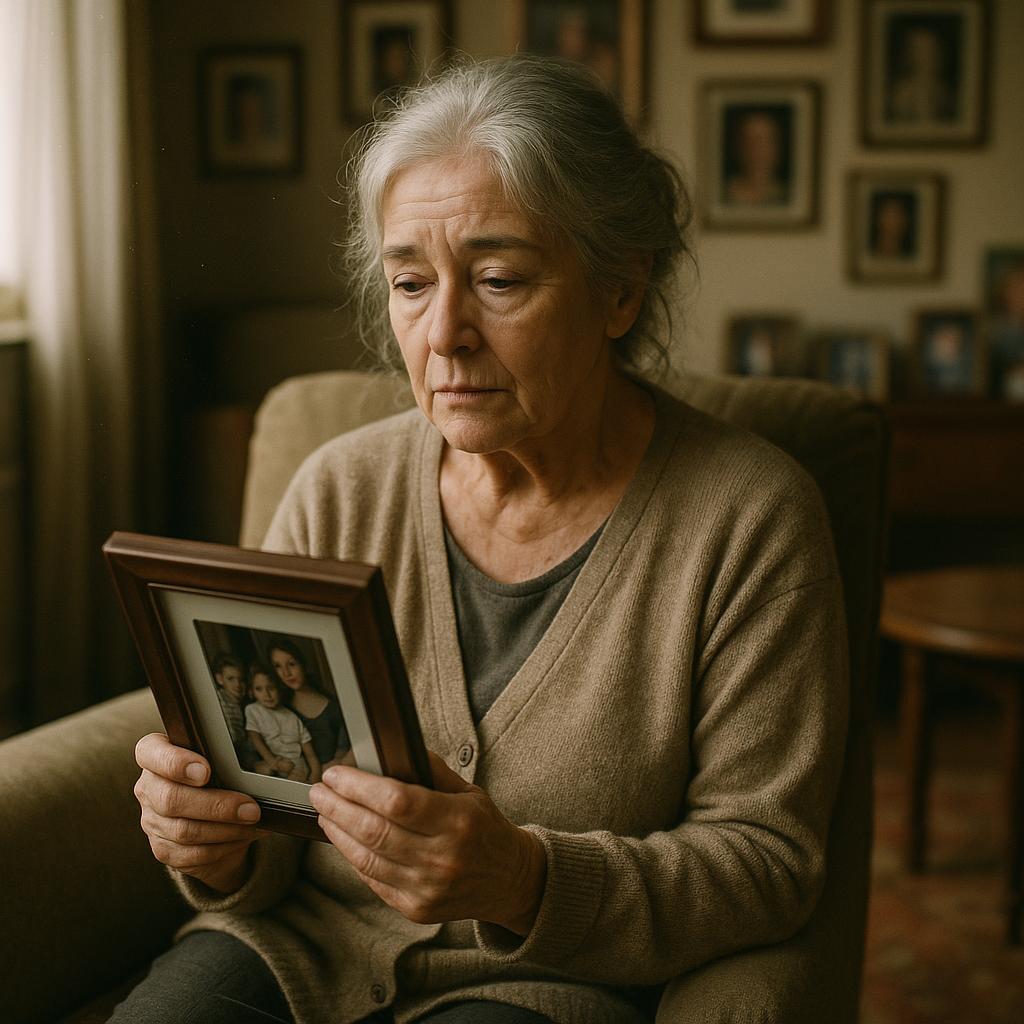 Image by RM AI
Image by RM AI
The Children I Thought I Knew
I sit cross-legged on the living room floor, our family album spread open before me. The leather-bound pages crackle as I turn them, each photo a knife to my heart. Here's Mark at seven, proudly presenting me with a fistful of dandelions he'd picked from our backyard, declaring them 'the prettiest flowers for the prettiest mom.' Now he won't even answer my calls. I trace my finger over a photo of Susan curled against me during a thunderstorm, her little body trembling until I promised the thunder couldn't hurt her. These days, she only texts to ask about 'paperwork progress' and 'timeline updates' – code for 'when do I get my money?' Then there's Emma, my baby, who would beg for 'just one more story, Mommy' every night, her eyes wide with wonder. Last week was my birthday; she didn't even send a text. I close the album, unable to reconcile these memories with the strangers my children have become. When did their inheritance become more valuable than their mother? When did I become nothing more than an obstacle between them and James's money? Tomorrow at the reading, they'll finally get what they've been waiting for – but it won't be what they expect.
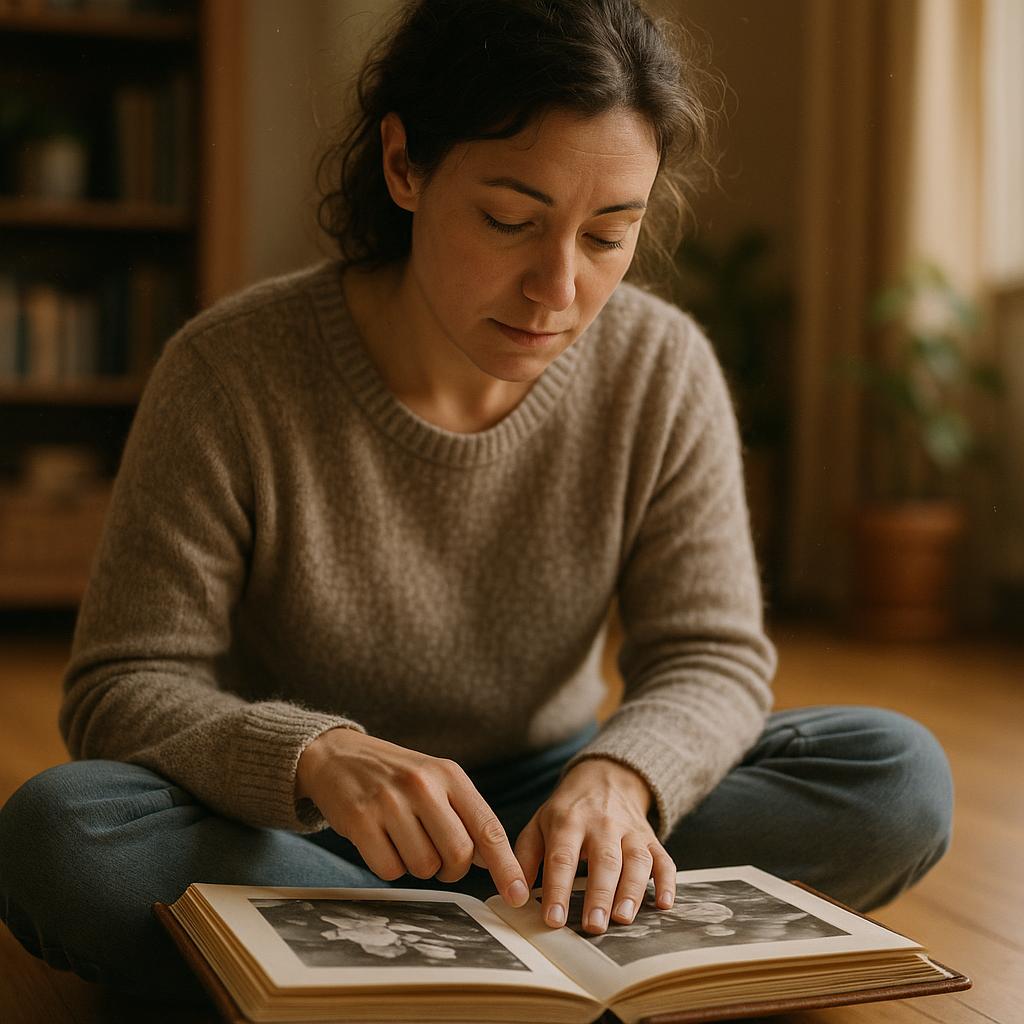 Image by RM AI
Image by RM AI
The Last Conversation
I remember those final weeks with James like they were yesterday. The hospital room became our little world, the beeping machines our constant soundtrack. Our children would visit, of course—dutiful appearances with flowers and forced smiles. But James saw right through them. 'They only come because they think they have to,' he whispered one night, his voice barely audible over the oxygen machine. His hand trembled in mine, skin paper-thin against my palm. 'But you're here because you want to be.' The clarity in his eyes surprised me. One evening, when we were alone, he asked me to bring him a specific box from his study at home. I found it tucked behind his financial folders—a simple wooden box containing a sealed envelope addressed to Robert, our lawyer of thirty years. James held that envelope like it contained gold. 'Promise me you'll be there when this is read,' he said, his eyes locking with mine. I nodded, confused but trusting. He smiled then, that same smile I fell in love with decades ago, and squeezed my hand. 'They think they know everything, Diane,' he whispered. 'But they have no idea what's coming.' I didn't understand then what he meant, but I would soon enough.
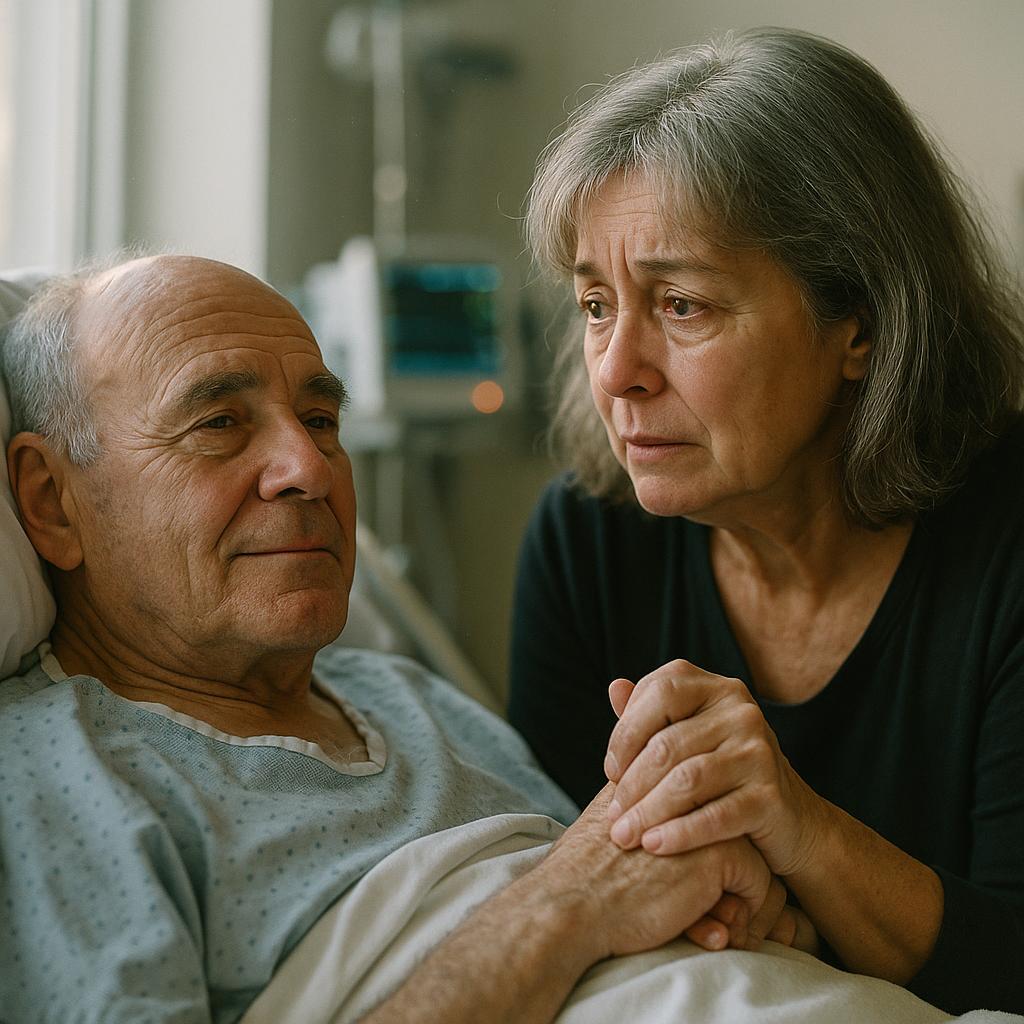 Image by RM AI
Image by RM AI
The Funeral That Revealed Everything
James's funeral was the most painful performance I've ever witnessed. The church was packed—half with genuine mourners who loved my husband, half with vultures dressed in designer black. I stood by the casket, accepting condolences, when I noticed Mark checking his watch every five minutes as if he had somewhere more important to be. Susan spent the entire service adjusting her Prada dress and whispering to her husband about who was wearing what. And Emma? My heart broke watching her take selfies by the flower arrangements, captioning them with #grief and #hardtimes while her eyes remained completely dry. But the moment that truly shattered any illusions I had left was overhearing Mark corner Robert near the refreshment table. 'When can we get this will business sorted?' he asked, his voice hushed but urgent, while literally standing ten feet from his father's casket. Robert's uncomfortable expression said everything. I locked eyes with him across the room, and in that silent exchange, I knew James had been right all along. Our children weren't mourning their father—they were calculating their inheritance. That night, alone in our bedroom, I held James's pillow and whispered, 'You saw it coming, didn't you? You always could see right through people.' Little did they know what was waiting for them at tomorrow's reading.
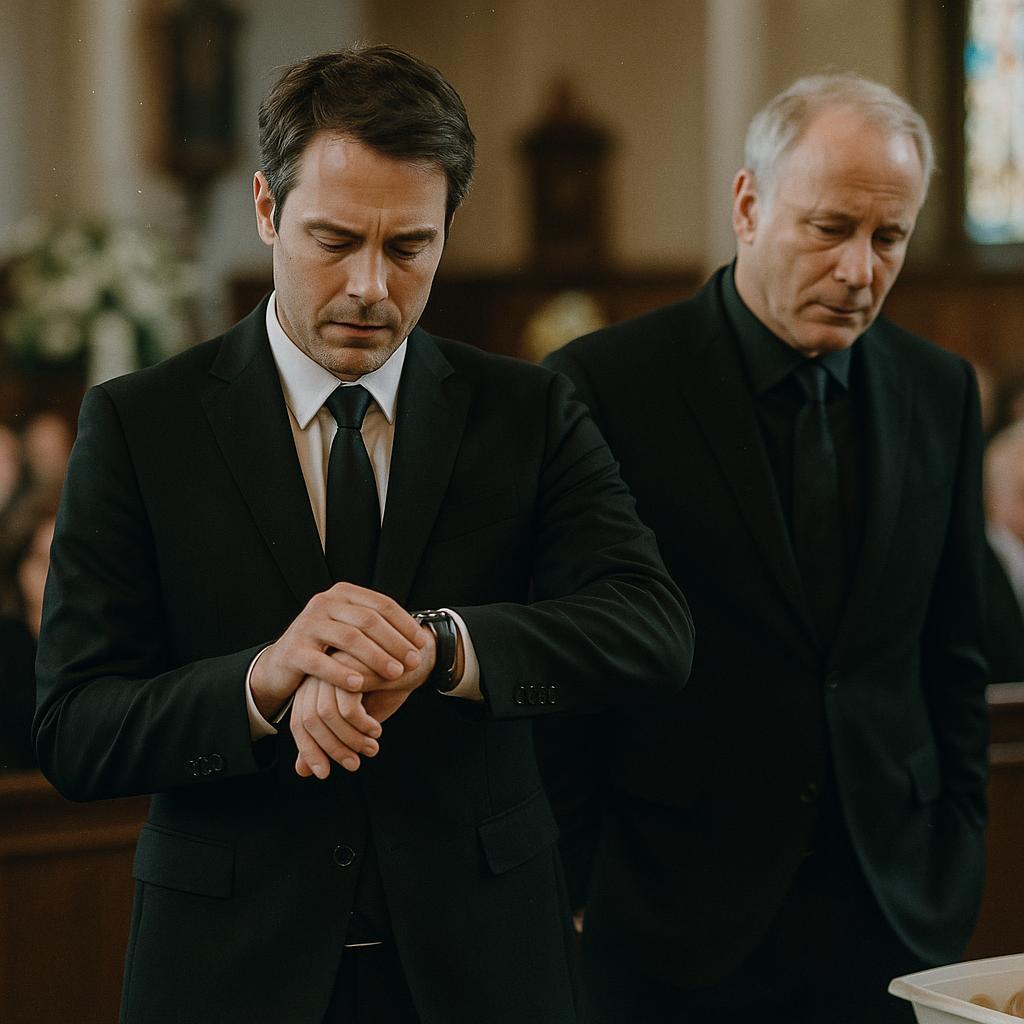 Image by RM AI
Image by RM AI
The Sudden Silence
The days after the funeral brought a silence so profound it felt like a physical presence in our home. I'd check my phone constantly, expecting to see Mark's name light up the screen or hear Susan's voice asking if I needed anything from the grocery store. Nothing. My son, who lived just twenty minutes away and used to drop by with coffee twice a week, suddenly couldn't find time in his schedule. 'Sorry, Mom, work's crazy right now,' he'd text when I reached out. Susan, who once insisted I join her family for Sunday dinners, now had a calendar mysteriously filled with 'other commitments.' I'd scroll through her social media posts showing elaborate meals with friends, the knife twisting deeper with each smiling photo. Even Emma, my baby who used to text me goodnight emojis every evening, now responded with nothing but 'k' and 'fine' when I asked how she was doing. One Tuesday, I baked Emma's favorite lemon bars and drove to her apartment as a surprise. Through her window, I could see her lounging on her couch, phone in hand. I knocked. She looked up, saw me, and deliberately turned away. I left the lemon bars by her door and cried the whole drive home. It's amazing how quickly love evaporates when money enters the equation. The inheritance had transformed me from 'Mom' to 'obstacle' overnight, and the realization hurt worse than any physical pain I'd ever experienced. But as the days of silence stretched into weeks, something inside me hardened. They thought they knew what was coming, but they had no idea what James had planned.
 Image by RM AI
Image by RM AI
Mark's True Colors
The phone rang this morning, startling me from my morning coffee ritual. Mark's name flashed on the screen—the first time in weeks. My heart leapt with hope. Maybe he'd finally remembered I existed beyond being James's widow. 'Mom,' he said, his voice dripping with that artificial sweetness he uses when he wants something. 'I was thinking about Dad's collection of vintage watches. I'd like to have them as a memento.' The watches. Of course. Not 'How are you holding up?' or 'Do you need anything?' Just straight to the inheritance grab. I took a deep breath, remembering how James would sit Mark on his lap as a little boy, letting him carefully wind each timepiece while explaining their history. 'Your father always intended those watches to be sold to fund our retirement,' I explained gently. The transformation was instant—like flipping a switch. 'Well, they're technically part of the estate now, aren't they?' he snapped, his true colors bleeding through the facade. Before I could respond, the line went dead. I sat there, phone in hand, tears welling up as I remembered the little boy who once made me macaroni necklaces and called me his 'best mommy ever.' That child was gone, replaced by a stranger who couldn't even disguise his greed long enough to finish a phone call. Tomorrow at the will reading, Mark would learn exactly what his father thought about his 'technically part of the estate' attitude.
 Image by RM AI
Image by RM AI
Susan's Unexpected Visit
The doorbell rang yesterday afternoon, and there stood Susan, my middle child, clutching an orchid that probably cost more than my weekly grocery budget. 'Mom!' she exclaimed with that practiced smile I've seen her use at charity galas—the one that never quite reaches her eyes. I invited her in, noticing how she scanned our living room as if mentally cataloging everything of value. For seventeen minutes—yes, I timed it—she asked about my health, my sleep, my grief support group, all while fidgeting with her diamond tennis bracelet. Then came the pivot I was waiting for. 'So, I've been thinking about you rattling around in this big house,' she said, stirring her untouched tea. 'I actually researched the market value of the Florida vacation property.' Before I could respond, she slid a business card across the table like a poker player revealing a winning hand. 'Just looking out for you, Mom. In case you want to downsize.' I turned the card over to find her phone number scrawled on the back as the 'contact person.' Not James's real estate attorney of twenty years. Not our family friend in Florida. Her. I smiled and tucked the card into my pocket, wondering if she'd practiced her 'concerned daughter' routine in the mirror before arriving. Tomorrow at the will reading, she'd learn exactly how transparent her performance had been.
Emma's Digital Distance
My youngest daughter, Emma, has always been the most tech-savvy of my children—and apparently, the most two-faced. When I texted her about meeting for lunch, her response was a masterclass in modern excuses. "Sorry Mom, fully booked with yoga this week" followed by "Content creation days are super demanding right now" and my personal favorite, "Got an influencer meeting I can't reschedule." Funny how she couldn't spare sixty minutes for the woman who spent eighteen hours in labor with her. That evening, as I sat alone with my chamomile tea, my phone buzzed with a notification. Emma had posted a tearful Instagram story featuring a photo I'd taken of her and James at the beach three summers ago. "Missing you every day, Dad ❤️ #griefjourney #familyfirst #daddysgirl." The comments section overflowed with heart emojis and sympathetic messages from people who had no idea she couldn't be bothered to answer my actual texts. I watched as she responded to every single comment with thoughtful replies while my messages remained on "read." The digital performance of grief was apparently much easier than the messy reality of supporting the parent who was still alive. Tomorrow at the will reading, she'd learn that her father had been watching her social media habits more closely than she realized.
 Image by RM AI
Image by RM AI
The Call from Robert
The phone rang at exactly 8:17 this morning, Robert's name lighting up my screen like a beacon in the fog of my lonely routine. I answered with a trembling hand, still clutching my morning tea. 'Diane,' he said, his voice carrying the weight of thirty years of friendship and professional distance, 'I've scheduled the reading of the will for next Tuesday at 10 AM.' Something in his tone made me pause—a mixture of caution and what almost sounded like anticipation. When I asked if I should inform Mark, Susan, and Emma, Robert cleared his throat. 'I've already contacted them,' he replied. 'All three responded within minutes.' The knife twisted deeper in my heart. Three weeks of my calls going straight to voicemail, yet Robert gets instant replies. I sank into James's armchair, the leather still molded to his shape. 'James left specific instructions about this meeting,' Robert continued, lowering his voice as if sharing a secret. 'Just... be prepared.' The cryptic warning hung between us. I thanked him and hung up, staring at the family portrait above our fireplace—the smiling faces of children who now couldn't even bother to check if their mother was alive unless there was money involved. Tuesday couldn't come soon enough. Let them rush to the lawyer's office with dollar signs in their eyes; they had no idea what was waiting for them.
 Image by RM AI
Image by RM AI
The Night Before the Reading
Sleep was a distant memory as I paced through our home at 2 AM, my fingertips trailing along the walls that held forty-two years of memories. In the kitchen, I could almost hear the echo of James's laughter as we slow-danced between the refrigerator and stove while waiting for water to boil. I wandered to our garden bench, where the moonlight cast the same silver glow that had illuminated thousands of conversations about dreams, children, and growing old together. In our bedroom, I pressed my face into his pillow, still refusing to wash the pillowcase that faintly held his scent. The silence was deafening until my phone suddenly erupted with notifications—three text messages arriving within minutes of each other. Mark: 'Need a ride tomorrow, Mom?' Susan: 'I can pick you up for the reading if you'd like.' Emma: 'Let me know if you want company on the way to Robert's.' After weeks of being treated like I was already dead, their sudden concern made me laugh bitterly in the darkness. I typed a single response to all three: 'I'll drive myself, thank you.' Then I switched off my phone, sank to the floor beside our bed, and let the tears flow freely—not for James this time, but for the family we once were and would never be again. Tomorrow would change everything, and they had no idea what was coming.
 Image by RM AI
Image by RM AI
Arriving at the Law Office
I pulled into Robert's parking lot at 9:45 AM, my hands still trembling slightly on the steering wheel. Taking a deep breath, I checked my lipstick in the rearview mirror—James always said a woman should face difficult moments looking her best. The parking spaces were already filled with my children's vehicles—Mark's $80,000 Range Rover (a 'business expense'), Susan's BMW convertible (a 'birthday gift' from her father), and Emma's Tesla (an 'environmental investment' James had funded). All those 'loans' that somehow never made it onto any repayment schedule. Through the large glass windows of Robert's office, I could see them huddled together like conspirators, heads bent close, hands gesturing emphatically. Mark was doing most of the talking, his face animated with what I recognized as his 'closing the deal' expression. When he glanced up and spotted me walking toward the entrance, the transformation was almost comical—like watching actors snap into character at 'Action!' He straightened, nudged Susan sharply with his elbow, and Emma's phone disappeared so quickly it might have evaporated. Suddenly, three solemn faces turned toward the door, eyebrows furrowed in practiced grief. I smoothed my dress, squared my shoulders, and reached for the door handle. Time for the performance of a lifetime—theirs and mine.
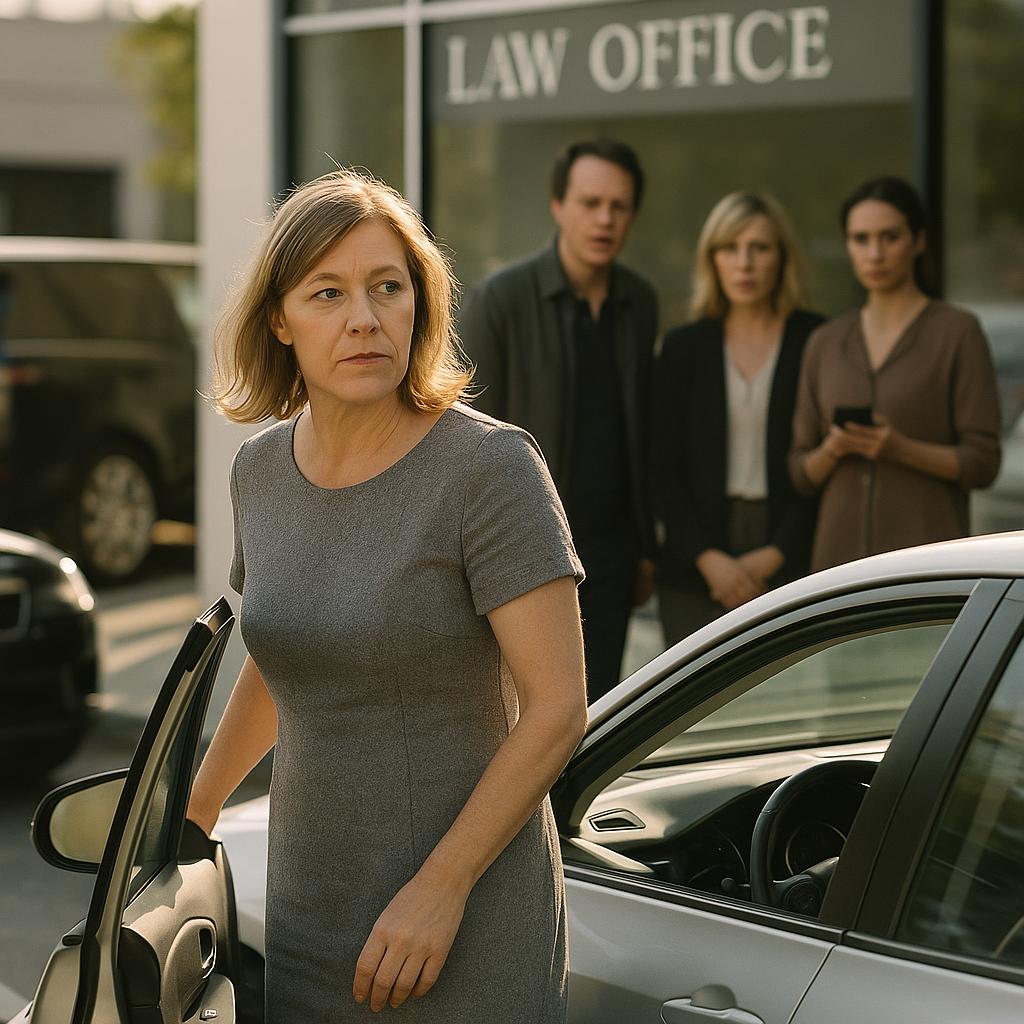 Image by RM AI
Image by RM AI
The Cold Reception
I stepped into Robert's reception area, feeling like I'd walked onto a poorly rehearsed stage play. Mark, my once affectionate son, approached with arms outstretched, but his hug was so stiff and brief I barely felt it—like hugging a mannequin dressed in an expensive suit. Susan, ever the image-conscious one, barely brushed her lips near my cheek while simultaneously checking her reflection in her compact mirror. God forbid her $80 lipstick get smudged during this mandatory display of daughterly affection. Emma didn't even bother with the pretense, offering only a distracted wave without looking up from whatever was so fascinating on her phone screen. The three of them stood there like actors who'd forgotten their lines, the silence between us thick enough to cut with a knife. Only Marta, Robert's assistant of fifteen years, offered any genuine human connection. "Mrs. Wilson, would you like some tea?" she asked, her kind eyes meeting mine with the warmth my own children couldn't muster. I nodded gratefully, wondering if my children realized how transparent their performance was—or if they even cared. As Marta led us toward the conference room, I caught her giving my children a look that spoke volumes. She'd seen this scenario play out before—grieving families transformed into strangers by the promise of inheritance. What she hadn't seen was what was about to happen next.
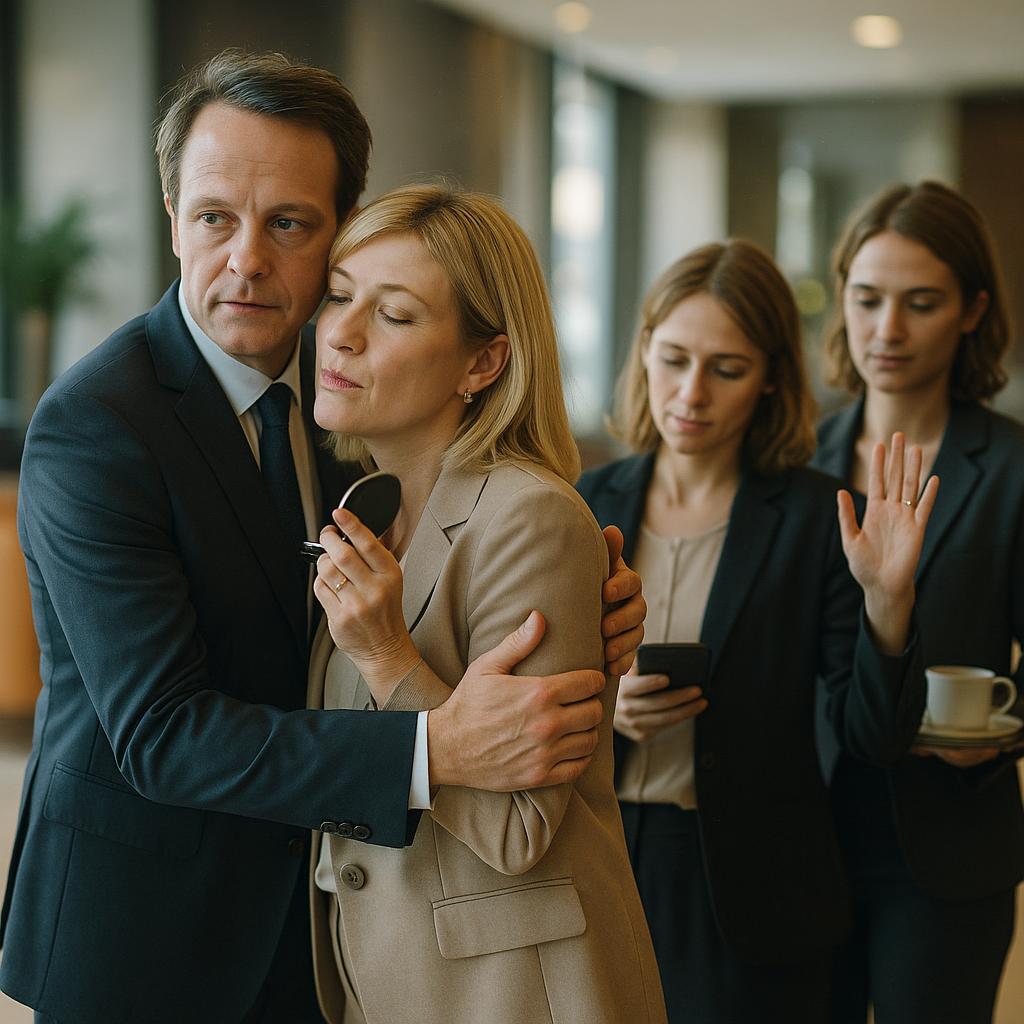 Image by RM AI
Image by RM AI
The Conference Room Tension
The conference room felt like a pressure cooker of greed and tension. I sat quietly at one end of the mahogany table, watching my children position themselves like chess pieces on a board. Mark, my once sweet little boy, had claimed the power seat directly across from Robert's empty chair. His expensive watch glinted under the recessed lighting as he drummed his fingers impatiently—tap, tap, tap—like he was counting down the seconds until his payday. Susan, ever the strategist, had somehow managed to sit closest to the stack of estate documents. I caught her manicured finger subtly trying to slide one paper closer, her eyes squinting to read the upside-down text. And Emma? My baby girl was physically present but mentally elsewhere, her face illuminated by the blue glow of her phone screen. Every few minutes, she'd glance up at the framed law degrees on the wall, and I swear I could see dollar signs reflecting in her pupils. The silence between us was deafening—these strangers wearing my children's faces couldn't even manage small talk with their own mother. James's words echoed in my mind: 'Just watch them, Diane. They'll show you exactly who they are.' And boy, was he right. They had no idea what storm was about to hit when Robert walked through that door.
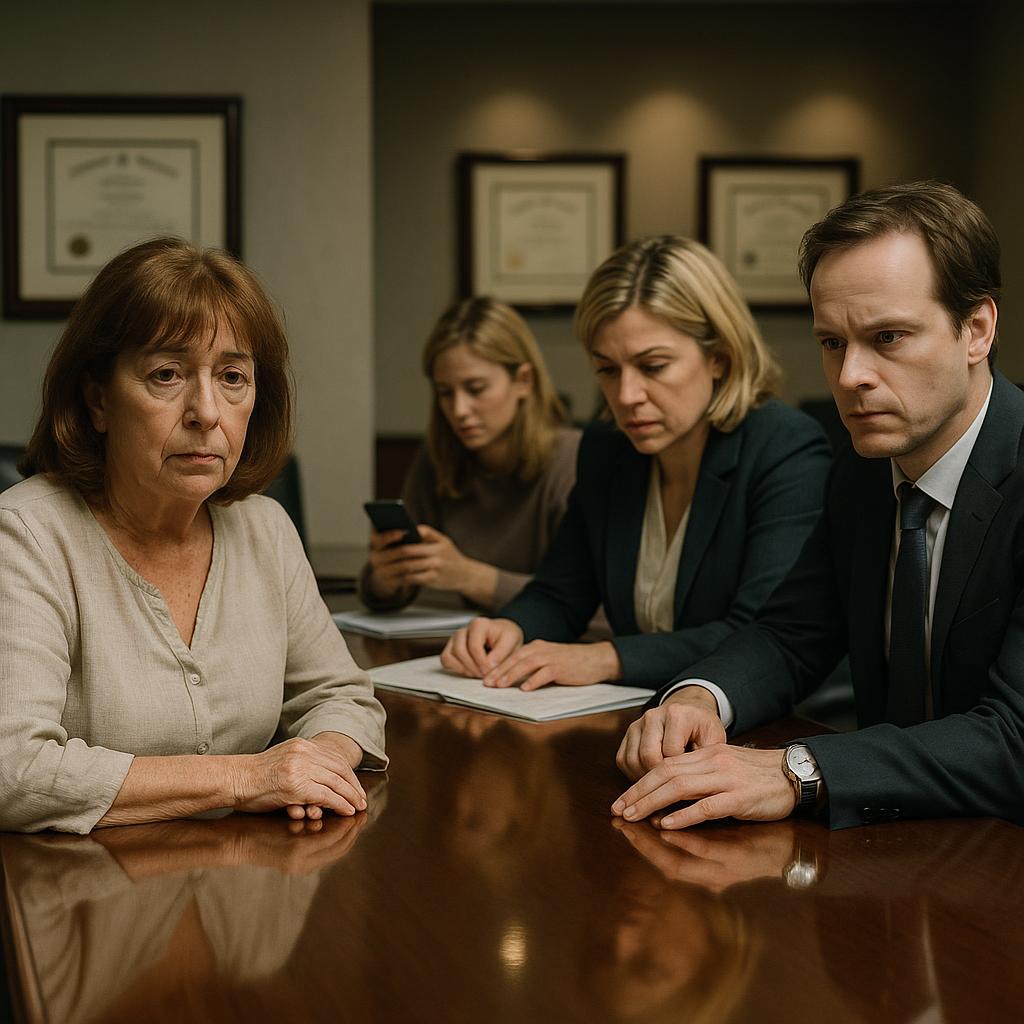 Image by RM AI
Image by RM AI
Robert Enters
The door opened with a soft click, and Robert entered the conference room carrying James's worn leather portfolio—the same one my husband had used for decades to store his most important documents. The air in the room instantly changed. My children, who moments ago couldn't be bothered to make conversation with their own mother, suddenly transformed like actors hearing their cue. Mark's slouch disappeared as he sat ramrod straight, his eyes locked on the portfolio like a hawk spotting a field mouse. Susan smoothed her hair and fixed a solemn expression on her face, though I caught the slight twitch at the corner of her mouth—anticipation poorly disguised as grief. Even Emma finally put her phone face-down on the table, her full attention on Robert for the first time all day. 'Before we begin,' Robert said, placing a hand protectively on the portfolio, 'I want to clarify that everything we're about to discuss reflects James's explicit wishes, documented and notarized six months ago.' I watched Mark's eyebrows shoot up at the words 'six months ago'—exactly when James's doctor had confirmed his cancer was terminal. Susan and Emma exchanged a quick glance, a silent conversation passing between them. None of them looked at me. They had no idea that six months ago, James and I had spent a long weekend discussing exactly what would happen in this very room, on this very day.
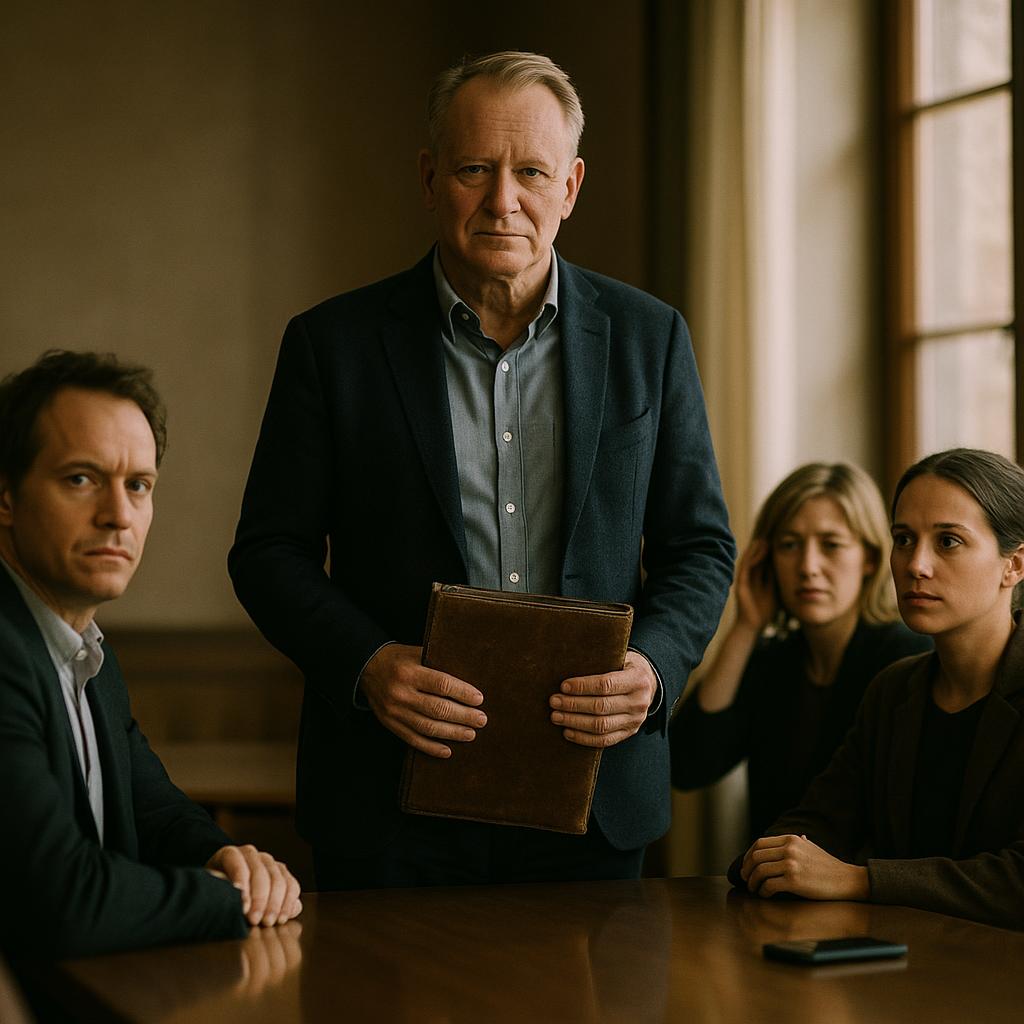 Image by RM AI
Image by RM AI
The Legal Formalities Begin
Robert cleared his throat and began reading from the legal documents, his voice taking on that formal tone lawyers use when they're about to change someone's life. 'I, James Wilson, being of sound mind and body...' The standard legal jargon filled the room like a fog. I'd heard it all before when James and I had prepared everything six months ago, sitting in this very office, holding hands as we made our decisions together. Mark's impatience was palpable—he kept checking his Rolex and sighing dramatically, as if each minute spent on formalities was costing him money. Susan couldn't keep still, smoothing her skirt repeatedly, her French-manicured nails clicking against her Prada purse in a rhythm that screamed 'hurry up.' Emma had finally detached from her phone, but only to admire her reflection in the window, subtly adjusting her hair and practicing what looked like sympathetic expressions. None of them were listening to the actual words. None of them noticed how Robert's eyes occasionally flicked to me with a knowing look. Then Robert paused, placing his reading glasses on the table with deliberate slowness. 'In addition to the formal will,' he announced, 'James Wilson left personal letters to be read aloud at this meeting.' The atmosphere in the room instantly changed—like the moment before a thunderstorm when the air gets heavy and electric. My children suddenly sat up straighter, their expressions shifting from boredom to intense focus. If only they knew what those letters contained.
 Image by RM AI
Image by RM AI
Mark's Letter
Robert pulled out the first envelope, and I watched Mark's eyes light up like a child on Christmas morning. My son—who once cried when he accidentally stepped on an ant—leaned forward eagerly, his expensive watch glinting under the office lights as he extended his hand. 'James requested these be read aloud,' Robert said firmly, pulling the letter just beyond Mark's reaching fingers. The disappointment on Mark's face was almost comical, like someone had yanked away his winning lottery ticket. Robert cleared his throat and began reading in a steady voice: 'To my son, who always thought money would solve his problems—remember that greed only creates new ones.' The transformation on Mark's face was instantaneous and complete. First came shock—his mouth actually hanging open—then embarrassment as his cheeks flushed crimson, and finally anger, his jaw clenching so tight I could almost hear his teeth grinding. He shot me an accusatory glance, as if I'd personally written those words to humiliate him. The son who couldn't be bothered to check on me for weeks was now staring at me like I was his enemy. If looks could kill, I'd have joined James right then and there. But this was only the beginning of James's final message to our children, and Mark had no idea what was coming next.
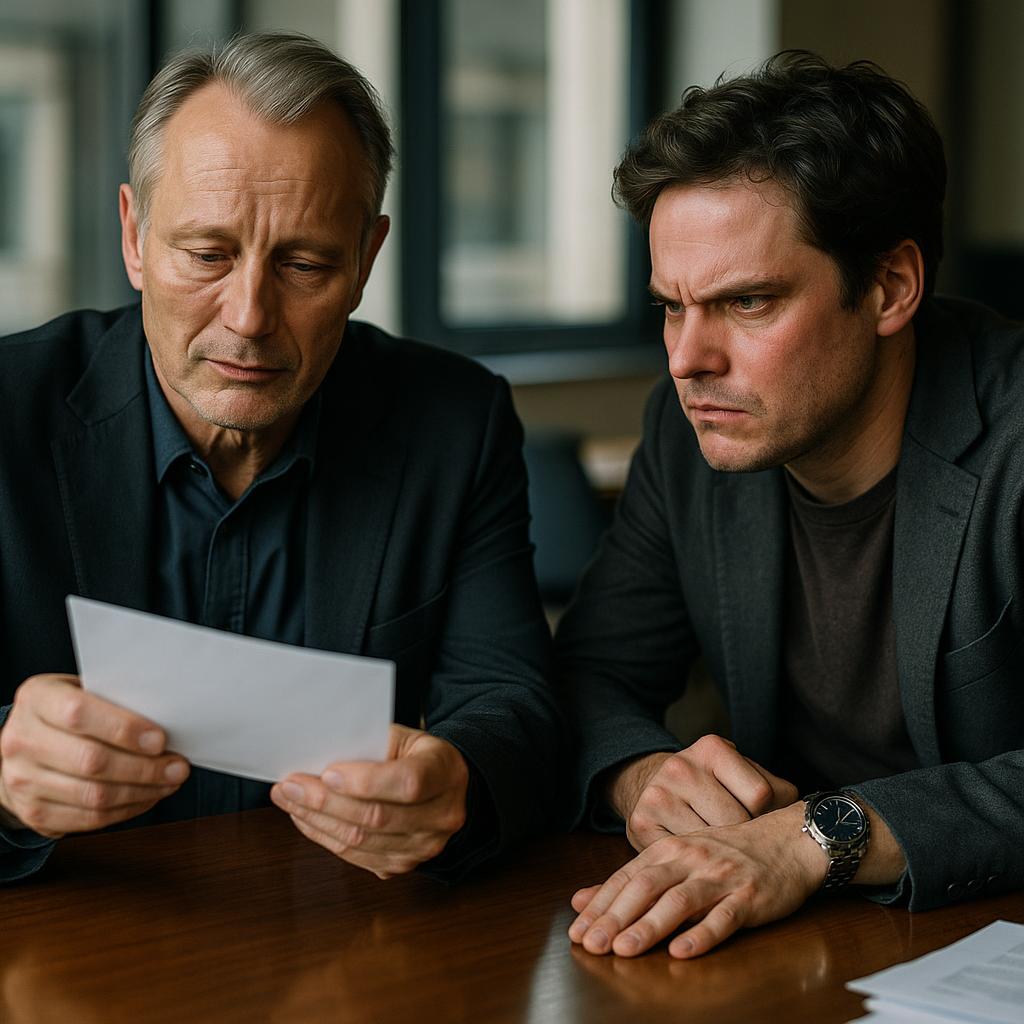 Image by RM AI
Image by RM AI
Susan's Turn
Susan's smirk evaporated faster than a puddle in July when Robert picked up the next envelope. She'd been practically glowing at Mark's humiliation, but karma works quickly in small conference rooms. 'To my daughter, who values appearances over character—wealth fades, but integrity lasts,' Robert read, his voice cutting through the tension like a knife through butter. I watched as Susan's perfectly composed face—the one she'd spent $400 on at the med spa last week—crumpled for just a heartbeat before her social training kicked in. She straightened her spine, tossed her highlighted hair, and crossed her legs in that defensive posture I'd seen a thousand times since she was a teenager caught in a lie. Her eyes darted between the remaining envelopes on the table, and I could practically see the calculations running behind them. Was there a second letter? A codicil? Some loophole that might still deliver the windfall she'd been counting on? Her manicured fingers gripped her designer purse so tightly her knuckles turned white. Meanwhile, Emma shifted in her seat, suddenly very interested in a loose thread on her sleeve. The room felt electric with unspoken tension as Susan's gaze finally landed on me, her eyes narrowing slightly as if I'd somehow orchestrated this public dressing-down from beyond the grave. If she only knew that James had written these letters entirely on his own, after watching how quickly his illness had transformed him from 'beloved father' to 'walking inheritance' in their eyes.
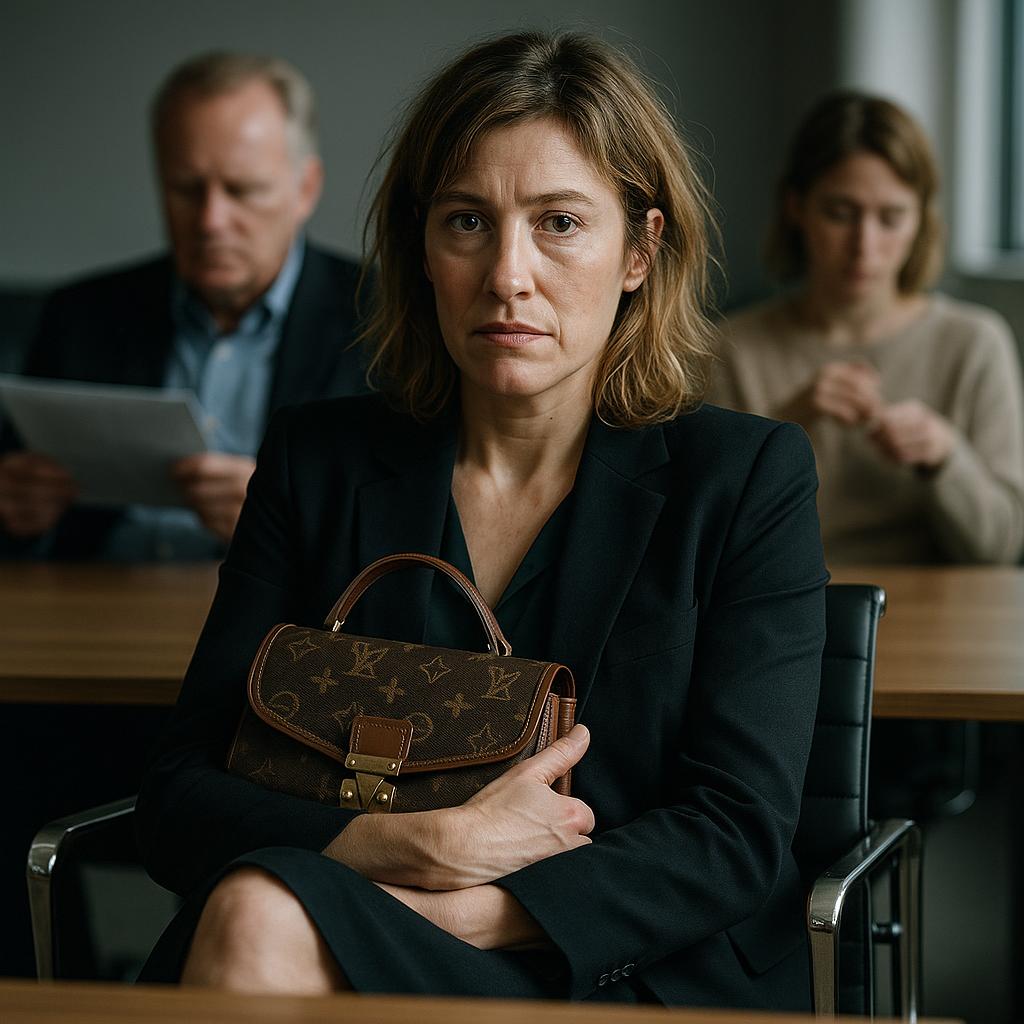 Image by RM AI
Image by RM AI
Emma's Message
Emma's phone slipped from her fingers when Robert picked up the third envelope. The clatter against the mahogany table seemed to echo in the suddenly silent room. I watched my youngest child—my baby girl who once couldn't sleep without me singing to her—visibly flinch as Robert's voice delivered James's final message to her. 'To my youngest, who feels too detached to care—you can't build a life staring at screens. Look up once in a while; the real world is worth it.' The carefully constructed wall of indifference Emma had maintained throughout the funeral, the weeks after, and even today, cracked right before my eyes. Tears welled up—genuine, unfiltered emotion—the first I'd seen from her since James's diagnosis. For a brief moment, I glimpsed my real daughter, not the curated online persona she'd been hiding behind. She quickly blinked away the tears, her hand instinctively reaching for her phone like an addict seeking their fix. But her fingers trembled so violently she couldn't even manage to unlock the screen. Instead, she stared at her own reflection in the black glass, perhaps truly seeing herself for the first time in years. The irony wasn't lost on me—the device that had been her shield against real emotions had now become a mirror forcing her to face them. As Robert set Emma's letter aside and reached for the final envelope—mine—I caught a glimpse of something I hadn't seen in my children's eyes for months: fear.
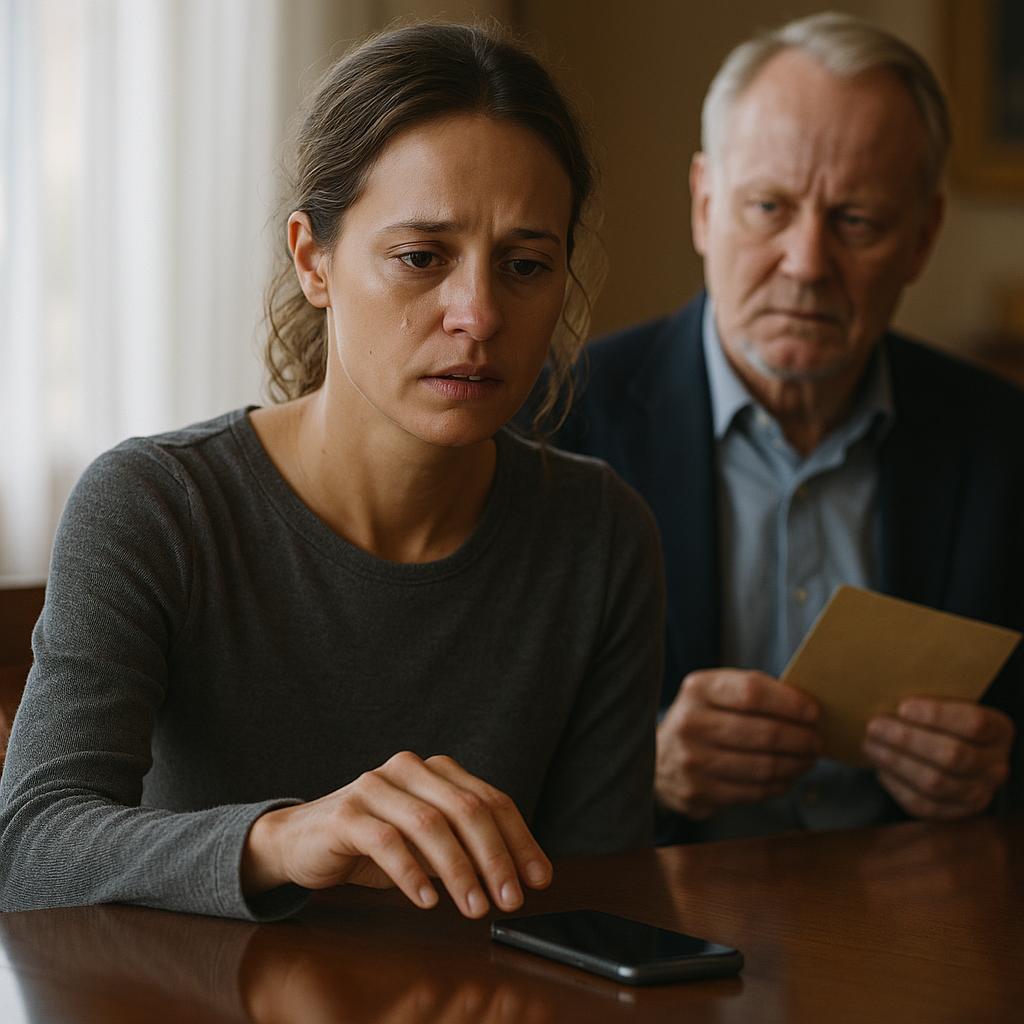 Image by RM AI
Image by RM AI
My Letter
Robert's fingers trembled slightly as he opened the final envelope—the one addressed to me. The room felt like it was holding its breath. 'To my beloved wife, Diane,' he began, his professional tone softening with each word. 'You were my true partner, my strength, and the heart of our family. Everything we built together belongs to you, just as my love always did.' Tears slid down my cheeks, but these weren't tears of grief—they were tears of vindication. James's words wrapped around me like the warm embrace I'd been missing since he passed. Robert continued, his voice growing firmer: 'As per the will, all assets, properties, and accounts are left solely to my wife, Diane.' The silence that followed was deafening. Mark's face contorted in disbelief, his mouth opening and closing like a fish out of water. Susan's perfectly applied makeup couldn't hide the fury blooming across her features. Emma's phone slipped from her hand again, clattering onto the table as she stared at me with wide, shocked eyes. I didn't need to look at them to feel the weight of their stares—a mixture of betrayal, anger, and the sudden, crushing realization that their father had seen through their act all along. What they didn't know was that this was only the beginning of James's final lesson about family, love, and consequences.
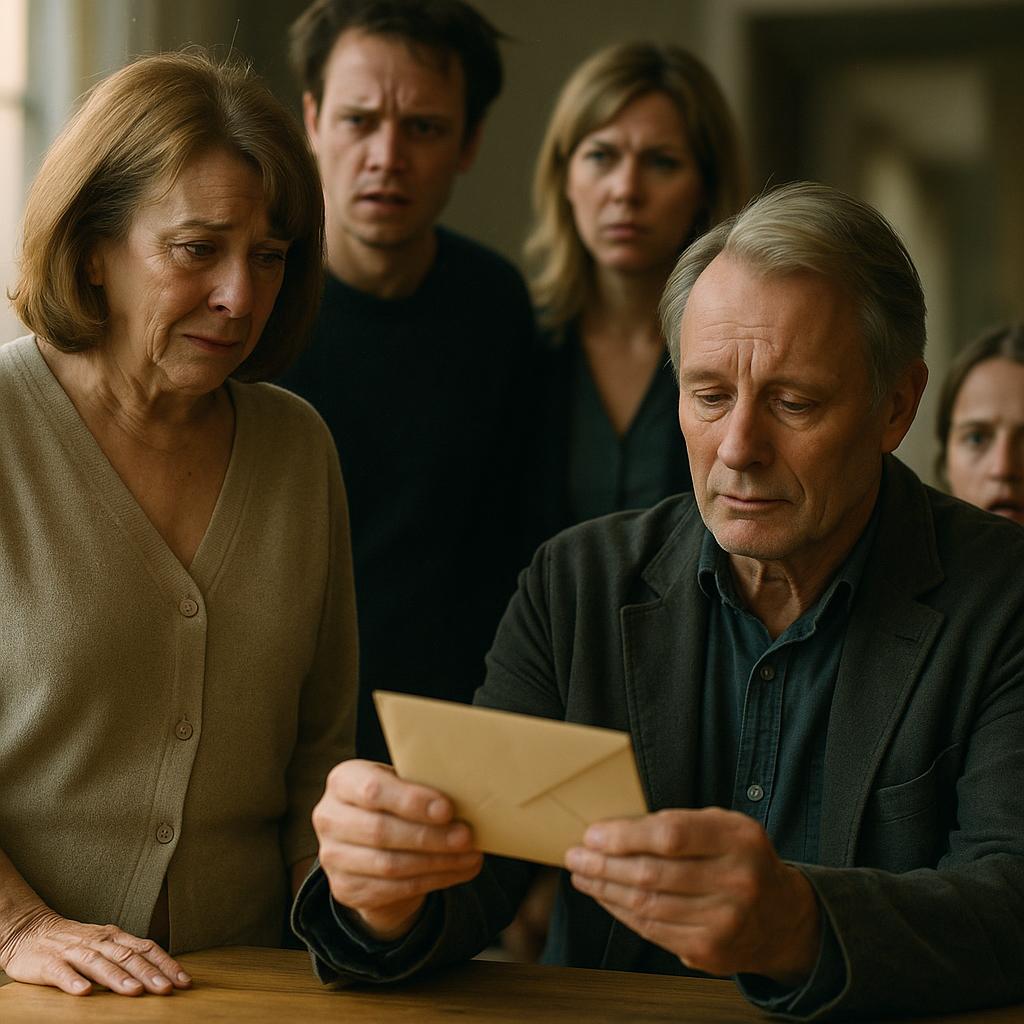 Image by RM AI
Image by RM AI
The Will's Revelation
Robert's words hung in the air like a physical presence. 'All assets, properties, and accounts are left solely to my wife, Diane.' The conference room seemed to shrink around us as my children processed what they'd just heard. Mark's face transformed through a series of emotions—shock, disbelief, and finally, a rage so intense I could almost feel the heat radiating from him. Susan's perfectly glossed mouth opened and closed repeatedly, like she was rehearsing arguments that wouldn't come. Emma's phone—her constant companion—tumbled from her limp fingers and hit the carpet with a soft thud, completely forgotten. I sat perfectly still, my back straight, hands folded in my lap, just as James and I had practiced. This moment wasn't about money—it was about truth. James had seen through their performance all along. He'd watched our children transform from loving family members into circling vultures the moment his diagnosis became terminal. This will wasn't his revenge; it was his final act of protection—not just of our assets, but of the truth about what our family had become. As the silence stretched to its breaking point, Mark finally found his voice, and what came out would change everything between us forever.
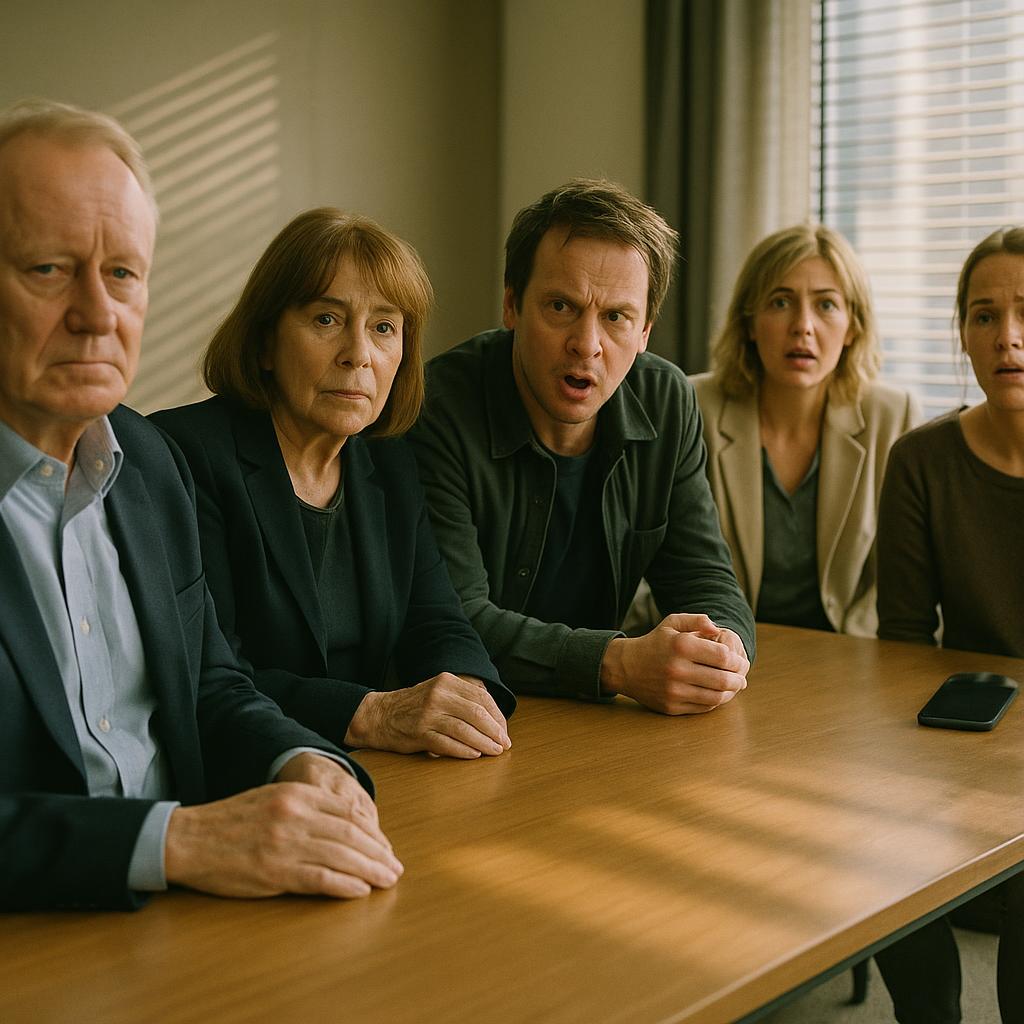 Image by RM AI
Image by RM AI
The Explosion
Mark was the first to explode, his fist slamming onto the mahogany table with such force that Robert's water glass nearly toppled. 'This is ridiculous!' he shouted, his face contorting with rage. 'Dad wasn't thinking clearly at the end!' Susan, never one to miss joining a drama, leapt to her feet, her designer heels clicking against the hardwood floor as she paced. 'We're his children!' she shrieked, her voice reaching a pitch that could shatter crystal. 'We deserve our share!' I noticed Emma hadn't joined the verbal assault, but the calculating look in her eyes worried me more than her siblings' outbursts. She was plotting something—I recognized that expression from when she was seven and trying to figure out how to blame her brother for the broken vase. Robert, bless him, remained the picture of professional calm. He simply opened another folder and spread out several official-looking documents across the table. 'Your father anticipated this reaction,' he said evenly, tapping the papers. 'These documents certify he was of sound mind when making these decisions—psychiatric assessments, medical evaluations, all properly witnessed and notarized.' Mark's face turned an alarming shade of red as he jabbed a finger in my direction. 'You did this!' he spat, his accusation hanging in the air between us like poison. 'You manipulated him when he was weak!' What happened next would haunt my children's nightmares for years to come.
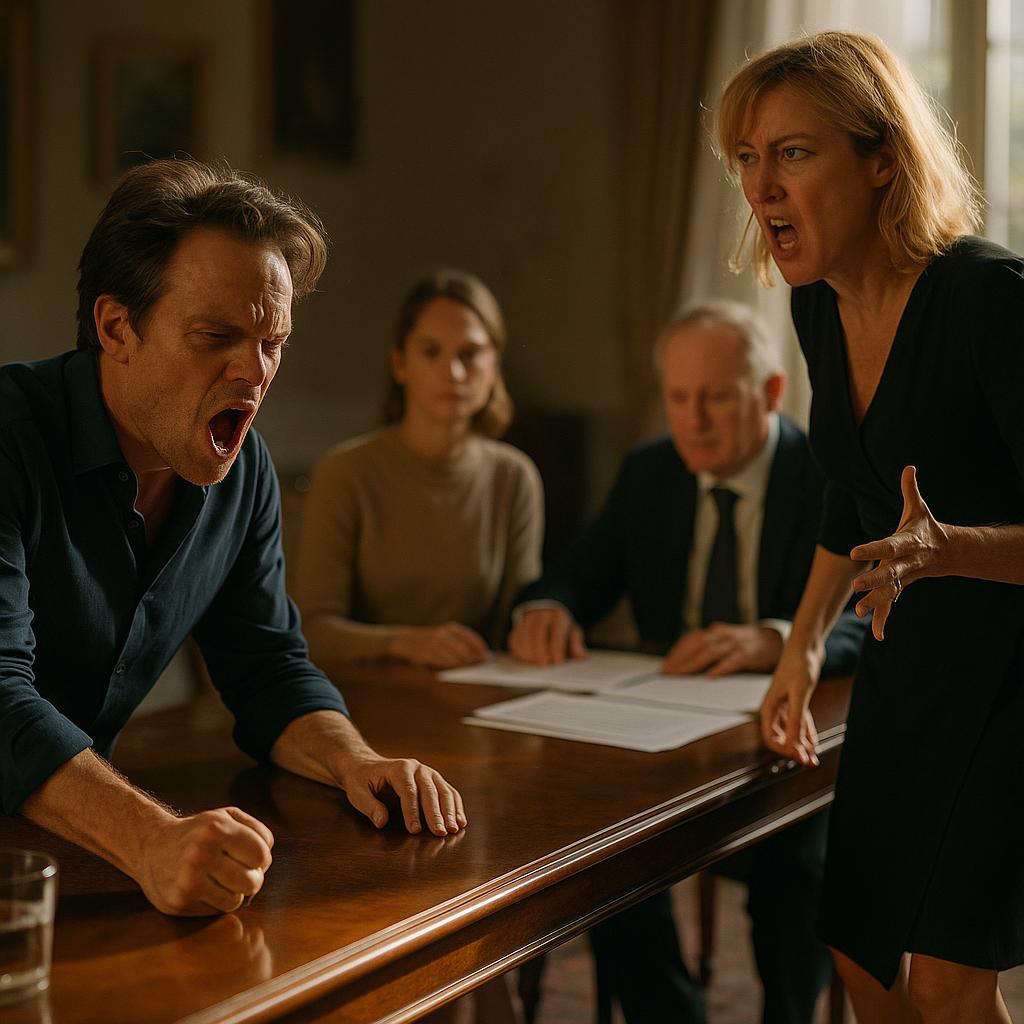 Image by RM AI
Image by RM AI
The Accusations
The conference room transformed into a battlefield of accusations. 'She manipulated him!' Mark shouted, standing now and gesturing wildly, his expensive watch catching the light as he pointed at me. 'She turned him against us!' Susan nodded vigorously, tears of frustration streaming down her face, smearing her perfect makeup. I watched silently as the $80 lipstick she'd been so careful not to get on my cheek earlier now ran in pink rivulets down her chin. 'We're contesting this,' she hissed, pulling out her phone to presumably call her lawyer husband. The irony wasn't lost on me—now she couldn't dial fast enough. Emma finally spoke, her voice cold and cutting: 'Did you know about this all along, Mom? Was this your plan?' I remained seated, letting their accusations wash over me like waves against a rock. Their true nature was on full display now, exactly as James had predicted during our late-night conversations when he was still strong enough to whisper. Robert caught my eye across the table, a silent question in his gaze: should he intervene? I gave him the slightest shake of my head. Let them show themselves completely. What they didn't realize was that James had left one more surprise—something that would make their current outburst look like a gentle summer breeze compared to the hurricane that was coming.
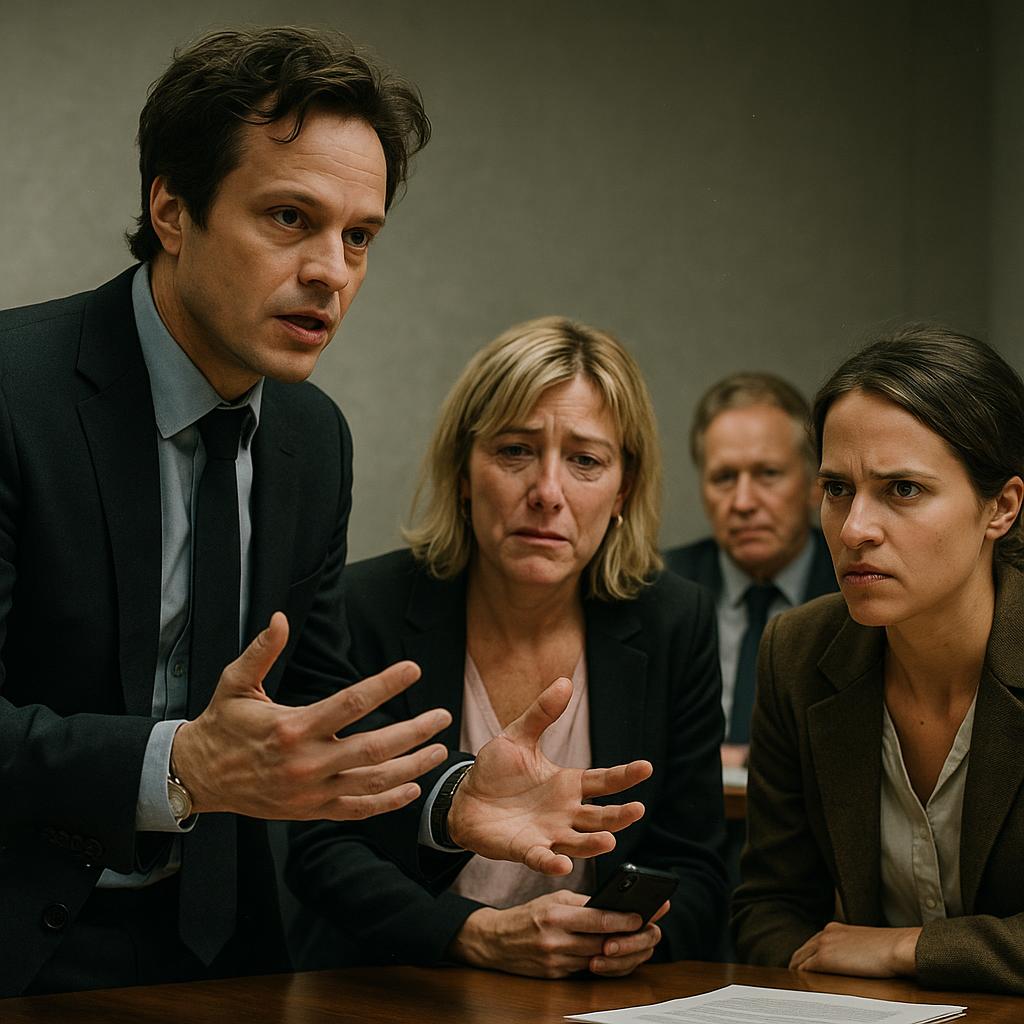 Image by RM AI
Image by RM AI
My Response
I finally rose from my chair, feeling strangely calm despite the chaos erupting around me. 'Your father made his choice,' I said, my voice quiet but firm enough to cut through their shouting. 'Maybe now you'll remember what really matters.' The conference room fell silent for a heartbeat as my words landed. Mark scoffed dramatically, his face still flushed with anger. Susan rolled her eyes like a teenager being told to clean her room, not a grown woman being denied millions. Emma—my sweet Emma who once couldn't bear to see anyone hurt—couldn't even look at me. I smoothed my dress with steady hands that surprised even me and accepted the portfolio Robert extended toward me. The leather felt warm, like James was somehow still holding it. As Robert escorted me to the door, my children's voices rose again behind us, a symphony of entitlement and rage. In the hallway, away from their venom, Robert squeezed my shoulder gently. 'James knew exactly what he was doing, Diane,' he said softly. 'He wanted to protect you.' I nodded, grateful for this man who'd witnessed our love story for over thirty years. What my children didn't know—what they were too blinded by greed to even consider—was that this wasn't the end of James's plan. Not by a long shot.
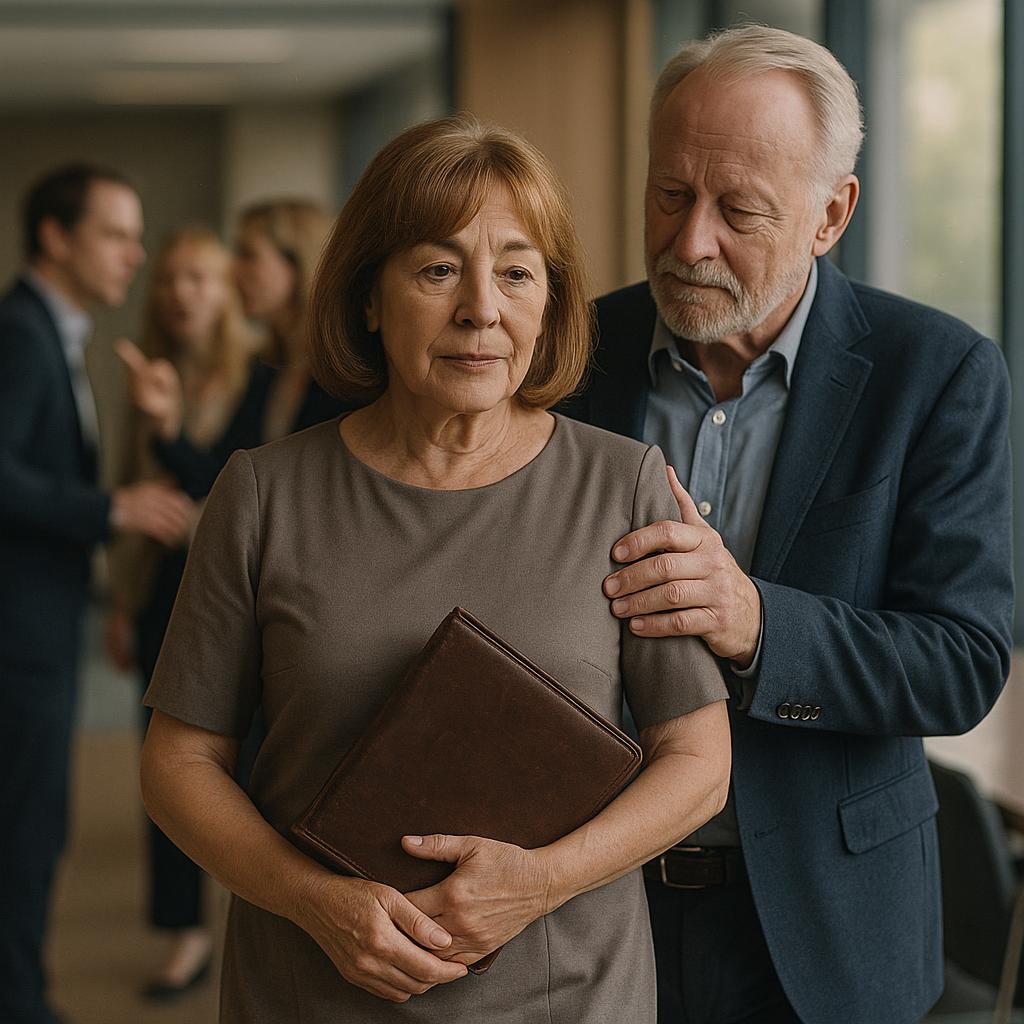 Image by RM AI
Image by RM AI
The Drive Home
The drive home felt like something out of a surreal dream—golden sunshine pouring through my car windows while my heart felt like it had been put through a paper shredder. I wasn't shocked by James's decision; we'd planned it together, after all. But the pure venom in my children's voices? That had cut deeper than I'd prepared for. At a red light, my phone erupted like a volcano—notifications cascading down my screen. Mark's text: "We're getting lawyers." Susan's voicemail: "Mom, please, we need to talk about this." Emma's message, surprisingly the most hurtful: "I always knew you were selfish." I switched the phone off completely and tossed it into my purse. My hands trembled slightly on the steering wheel as I remembered sitting cross-legged on our living room floor twenty-five years ago, teaching those same children to share their toys. "Remember to share with your sister, Mark." "Susan, let Emma have a turn." How had we failed so spectacularly at teaching them to share their hearts? The irony wasn't lost on me—the same children who once fought over plastic dinosaurs were now preparing for war over their father's money. What they didn't realize was that James had left one more lesson for them to learn, and it would begin the moment I pulled into our driveway.
 Image by RM AI
Image by RM AI
The Empty House
I pushed open the front door to a house that felt both familiar and strangely new. The silence that had suffocated me that morning now wrapped around me like a comforting blanket. Funny how grief changes things—even silence has different textures. I moved through the hallway, past the family photos I couldn't bear to look at, and into the kitchen where James and I had spent thousands of evenings. The kettle whistled—a sound that used to signal our evening ritual. One cup for him, one for me, talking about our day while the steam rose between us. Now I made just one cup, the single spoon clinking against ceramic sounding impossibly loud. Tea in hand, I walked to James's study, where his presence lingered most strongly. The worn leather chair still held the impression of his body. His books remained arranged by subject rather than author (a quirk that drove our librarian friend Martha absolutely insane). The framed photo of us on our 40th anniversary—me laughing as James smeared cake on my nose—watched over the room. With trembling fingers, I pulled open his desk drawer and found what I was looking for: a sealed envelope with my name written in his unmistakable handwriting. This wasn't part of the will. This was something else entirely—something private, meant only for me. As I broke the seal, I had no idea that what James had written would change everything all over again.
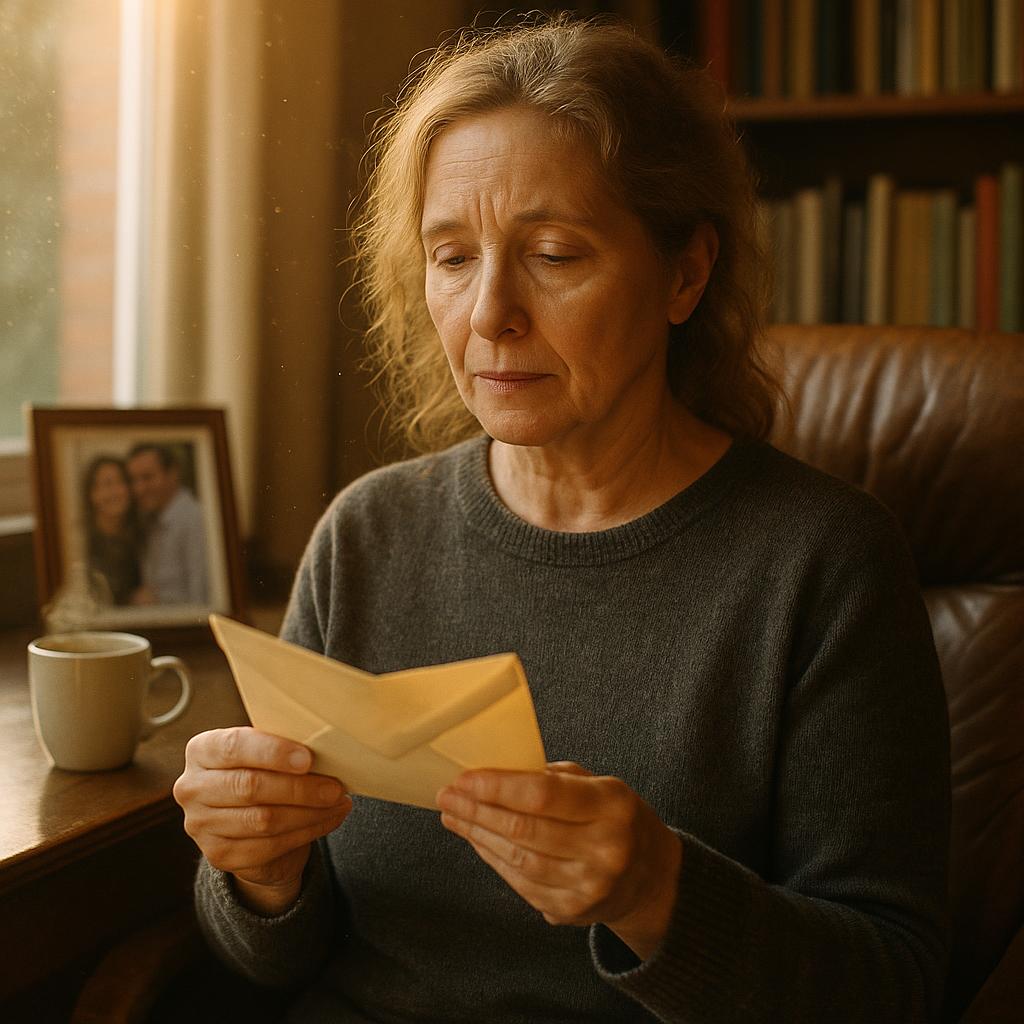 Image by RM AI
Image by RM AI
James's Private Letter
I settled into James's chair, the leather still holding his shape, and unfolded the letter with shaking hands. 'My dearest Diane,' his familiar handwriting brought his voice to my ears as if he were sitting beside me. 'If you're reading this, then Robert has done as I asked, and you now know everything.' Tears blurred the words as I read how he'd watched our children transform over the years—Mark's growing obsession with status, Susan's increasing superficiality, Emma's digital withdrawal. 'I tested them,' he wrote, describing small moments I'd never noticed: checks sent back with 'accounting errors' to see if they'd mention it (they never did), deliberate mistakes in conversation to see if they were truly listening (they weren't), invitations declined to see if they'd persist (they didn't). 'They need to learn what really matters,' his words continued, 'and sometimes the hardest lessons are the most necessary.' I traced my finger over the ink, feeling the indentations where he'd pressed harder in emphasis. 'Don't think I've abandoned them completely, my love. There's more to this plan than they—or you—know yet.' My heart skipped as I turned the page and discovered what James had really been planning all along.
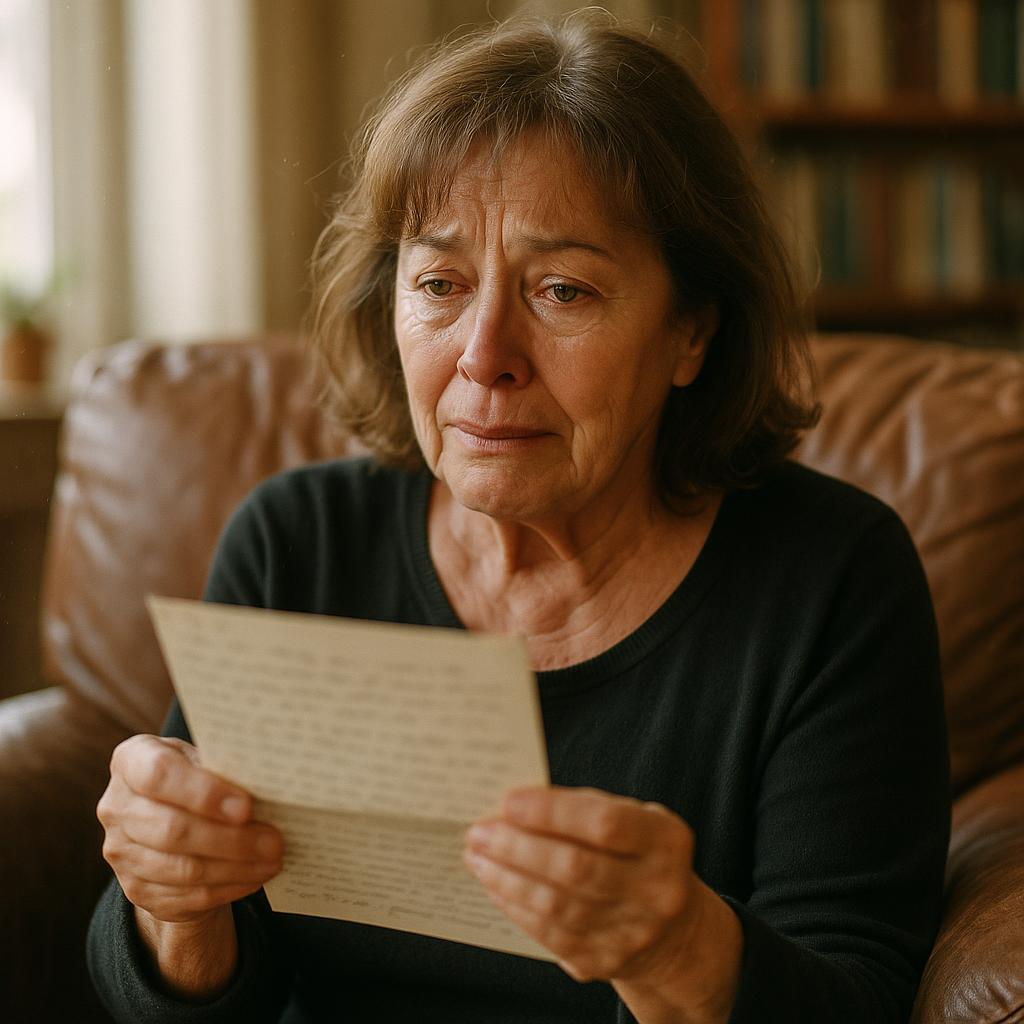 Image by RM AI
Image by RM AI
The Final Page
The final page of James's letter made my heart skip. 'If you choose to, Diane, you can still help them,' he wrote. 'Not with handouts that would only reinforce their worst tendencies, but with opportunities to become the people I know they could be.' My fingers traced his handwriting as I read about a trust he'd designed—one with conditions that would require genuine change from our children before they'd see a penny. Mark would need to volunteer at the homeless shelter where James had served for years. Susan would have to work with young girls struggling with self-image. Emma would need to disconnect from her devices and reconnect with actual people. 'But this is entirely your choice,' he emphasized, the pen having pressed deeply into the paper. 'You owe them nothing more than you've already given.' I folded the letter carefully, my mind spinning. Part of me wanted to call them immediately, to offer this olive branch. Another part remembered their faces in that conference room—the naked greed, the accusations, the ugliness that had been festering for years. James had given me not just his estate but something far more valuable: the power to choose what happened next. As I sat in his chair, surrounded by his books and his scent still lingering in the fabric, I realized what I needed to do. And it would shock everyone, including James himself.
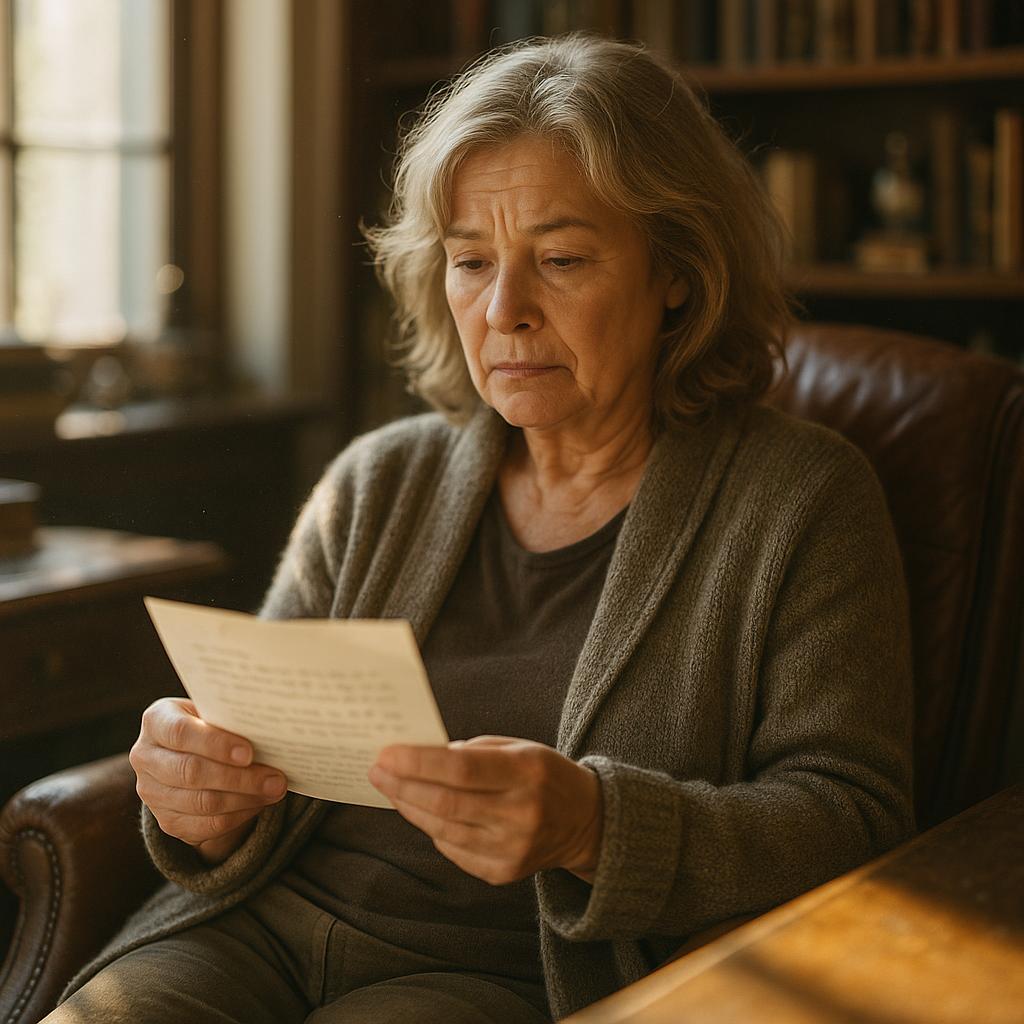 Image by RM AI
Image by RM AI
The Legal Threat
The next morning, my phone pinged with an email notification that made my stomach drop. Richard—Susan's husband and the family's self-appointed legal expert—had sent a message so coldly professional it might as well have been carved from ice. 'Dear Diane,' it began, as if we hadn't shared twenty Christmases together. 'In light of recent developments regarding James's estate...' The email went on to threaten legal action, citing 'undue influence' and 'mental incapacity'—phrases that made my blood boil. Attached were documents for me to sign that would 'voluntarily redistribute' James's estate among the children 'to avoid costly legal proceedings.' Translation: Give them what they want, or they'll drag their dead father's name through court. I printed the email with hands that didn't shake—anger had replaced my grief for the moment—and set it aside for Robert. Then I deleted the message without responding. Not a single word. What Richard and my children didn't realize was that James had anticipated this exact move. My husband knew our children better than they knew themselves, and he'd prepared for every scenario—including this one. As I sipped my morning coffee, staring at the garden James had planted, I couldn't help but smile slightly. They thought they were playing chess, but James had already won the game before they even sat down at the board.
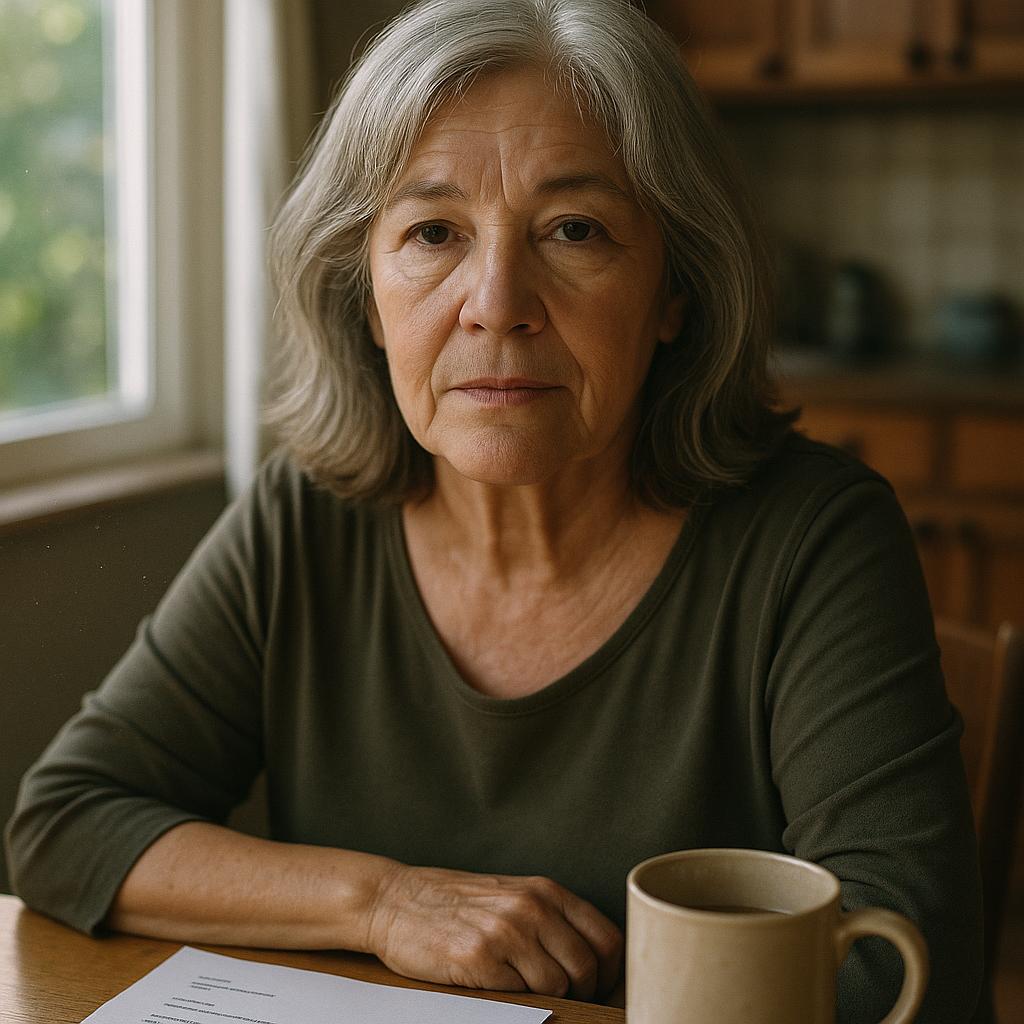 Image by RM AI
Image by RM AI
Mark's Unexpected Visit
The doorbell rang three days after the will reading, startling me from my thoughts. I wasn't expecting visitors—certainly not Mark standing on my doorstep clutching a bouquet of lilies. My favorite flowers. I wondered if Susan had reminded him of that detail. 'Mom, can we talk?' he asked, his voice softer than it had been in the lawyer's office. I stepped aside silently, letting him in. He paced our living room—James's living room—like a salesman preparing his pitch, occasionally glancing at the Degas sculpture his father had purchased on our 30th anniversary trip to Paris. I sat quietly, watching his performance unfold. 'I've been thinking about everything,' he began, running his hand through his hair exactly like James used to do when nervous. 'I said things I shouldn't have.' His apology sounded rehearsed, each word carefully selected for maximum effect. I'd heard this tone before—when he needed money for his first business venture, when he wanted us to co-sign his mortgage. After fifteen minutes of hollow explanations and manufactured remorse, he finally reached his real purpose. 'For the sake of family harmony,' he said, leaning forward with practiced sincerity, 'don't you think you should reconsider Dad's hasty decision?' I almost laughed. Even now, he couldn't help revealing his true intentions—he hadn't come for reconciliation; he'd come for the money. What Mark didn't realize was that I had James's letter in my pocket, and I was about to change the game entirely.
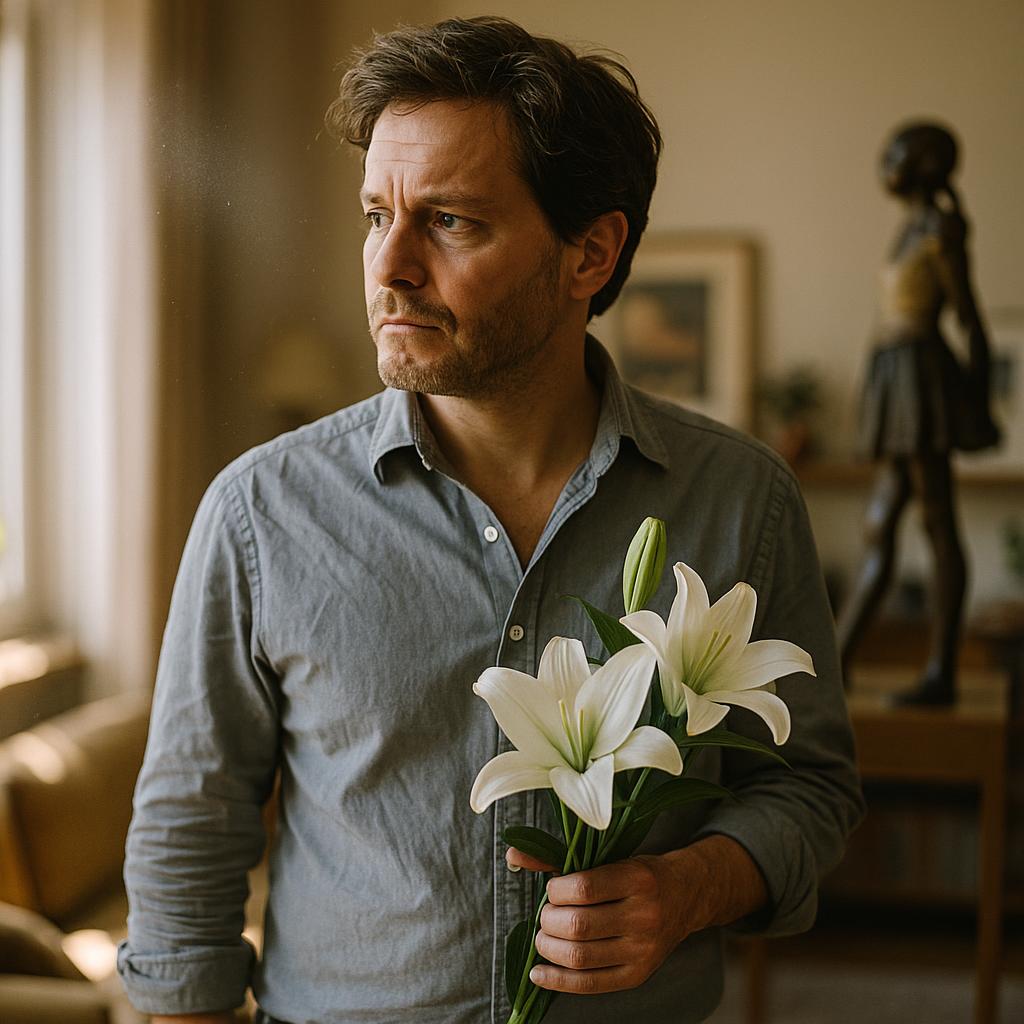 Image by RM AI
Image by RM AI
The Truth Comes Out
I gestured to the kitchen table and offered Mark tea, watching him shift uncomfortably in the chair where he'd eaten countless family dinners. His fingers drummed impatiently against the porcelain cup I'd placed before him—the good china set we only used for 'special occasions.' How fitting. 'Your father wasn't hasty, Mark,' I said quietly, meeting his gaze. 'He spent years observing how you, Susan, and Emma behaved when you thought no one was looking.' The practiced sympathy on Mark's face cracked instantly, revealing flashes of the same raw anger I'd witnessed in Robert's office. 'So this is punishment?' he snapped, voice rising. 'For what—not calling enough? Not visiting every weekend?' I set down my cup with deliberate care, the gentle clink against the saucer cutting through his indignation. 'No, Mark. It's a consequence. There's a difference.' His eyes narrowed as he processed my words, realizing his rehearsed performance wasn't working. The charming, contrite son act dissolved completely. 'You know what?' he said, standing so abruptly his chair scraped loudly against the floor. 'Dad was right about one thing—you two deserved each other.' He stormed out, slamming the front door hard enough to rattle the windows and shake the family photos on the wall. What he didn't know was that I had already made my decision about James's secret trust—and it would change everything.
 Image by RM AI
Image by RM AI
Susan's Strategy
Three days after Mark's dramatic exit, Susan called. 'Mom, let's have lunch—just us girls,' she said with that honeyed voice she reserved for clients and people she wanted something from. I agreed, curious to see her approach. She chose Bellini's—that upscale Italian place where the waiters wear bow ties and a salad costs more than a week's groceries. When I arrived, Susan was already there, perfectly coiffed in her designer suit, a gift bag placed strategically beside her. 'Mom!' she exclaimed, rising to air-kiss my cheeks. 'You look wonderful!' The cashmere sweater in the bag was exactly my size and favorite shade of blue—a detail she must have consulted with Emma about, since she hadn't noticed my preferences in years. Throughout lunch, Susan was the picture of daughterly devotion, pulling out childhood photos from her purse ('Remember this camping trip?') and asking about my arthritis with seemingly genuine concern. It wasn't until the tiramisu arrived that she finally revealed her hand. 'Richard says these situations can be so stressful for everyone involved,' she said, reaching across to squeeze my hand. Her diamond tennis bracelet caught the light as she leaned in. 'We just want what's fair, Mom.' I gently withdrew my hand, wondering if she realized I'd watched her perfect this performance technique on reluctant clients for years. What Susan didn't understand was that unlike her business associates, I knew exactly what she looked like when she was lying.
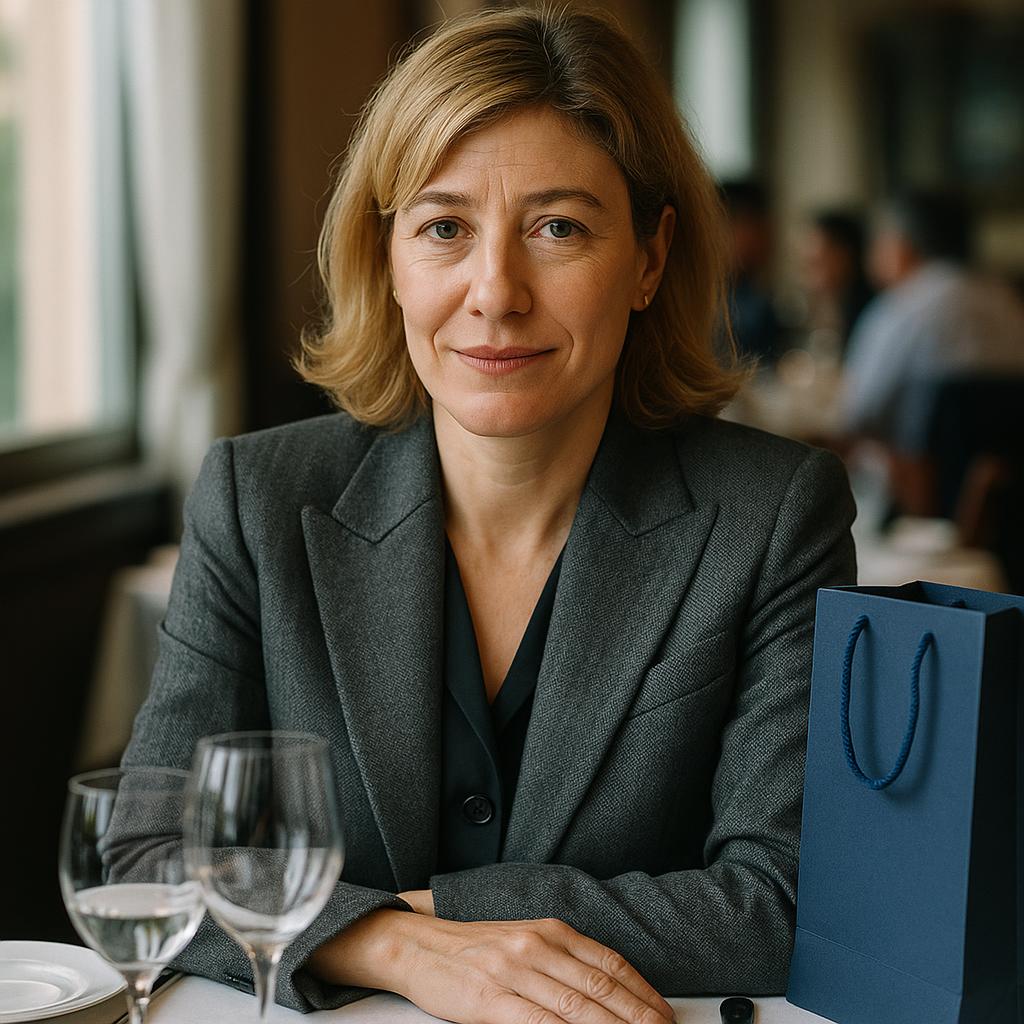 Image by RM AI
Image by RM AI
The Restaurant Confrontation
I looked Susan straight in the eyes across our fancy lunch table. 'What's fair, Susan?' I asked, my voice barely above a whisper but sharp enough to cut through her practiced charm. 'That you ignored your father's calls during his final months? That you spent exactly forty-five minutes at the hospital when he was dying, most of it on your phone?' The restaurant suddenly felt too quiet, as if everyone could hear us. Susan's perfectly composed face—the one she'd spent thousands on maintaining with Botox and fillers—cracked like thin ice. 'That's not fair!' she hissed, leaning forward to avoid being overheard by the couple at the next table. 'I was busy with the children and—' I raised my hand slightly, stopping her mid-sentence. 'Your children were with your nanny, Susan. You were at a spa.' I took a sip of my water, letting the words sink in. 'Your father saw the check-in you posted.' The color drained from her face so quickly I thought she might faint. Her manicured fingers trembled against her water glass as the realization hit her: we had known everything. Every excuse. Every lie. Every moment she chose herself over her dying father. The waiter approached with the check, oblivious to the bomb I'd just dropped on our table. What Susan didn't know was that I was just getting started.
 Image by RM AI
Image by RM AI
Emma's Approach
A week after Susan's lunch fiasco, I discovered Emma's approach—the most calculated of all. While scrolling through Facebook, I nearly choked on my tea when I saw my youngest daughter's profile. Overnight, Emma had transformed her usually selfie-filled social media into a shrine to her father. Suddenly, her Instagram and Facebook were flooded with carefully filtered throwback photos of her and James—pictures I recognized from family albums she hadn't opened in years. Each post came with paragraph-long captions about 'processing grief' and 'family bonds being tested.' She never mentioned me by name, but the implications were crystal clear: 'Some people show their true colors when money is involved... #StayingStrong.' Her followers swarmed like angry bees, offering sympathetic comments and outrage on her behalf. 'You poor thing!' they wrote. 'How could anyone do this to you?' I watched in disbelief as complete strangers condemned me without knowing a single fact. The daughter who couldn't be bothered to visit her dying father was now portraying herself as the heartbroken victim of my apparent cruelty. What Emma didn't realize was that her father had anticipated this too—and the next phase of his plan would expose her digital performance for exactly what it was.
 Image by RM AI
Image by RM AI
The Social Media Storm
My phone wouldn't stop buzzing. Every notification felt like another tiny dagger. 'Diane, is everything okay?' texted Martha from book club. 'Just saw Emma's video... call me if you need to talk,' wrote my cousin Beth. I finally had to turn the phone off completely, unable to bear the concerned messages from people who'd seen my daughter's digital performance. Emma's tearful video about 'family betrayal' had gone viral in our small community, complete with carefully selected childhood photos and dramatic music playing in the background. The comments section was filled with strangers calling me everything from 'gold-digger' to 'monster'—people who knew nothing about our family or James's careful planning. I sat in our garden, surrounded by the roses James had planted, wondering what he would advise. 'The truth will out,' he used to say whenever the children tried hiding something from us. But this truth was complicated, messy. Emma had weaponized social media against me, turning private family matters into public entertainment. As I watched a hummingbird dart between the flowers, I realized James had prepared me for everything except becoming the villain in my own children's story. What none of them knew was that I was about to change the narrative completely—and I wouldn't need a tearful video to do it.
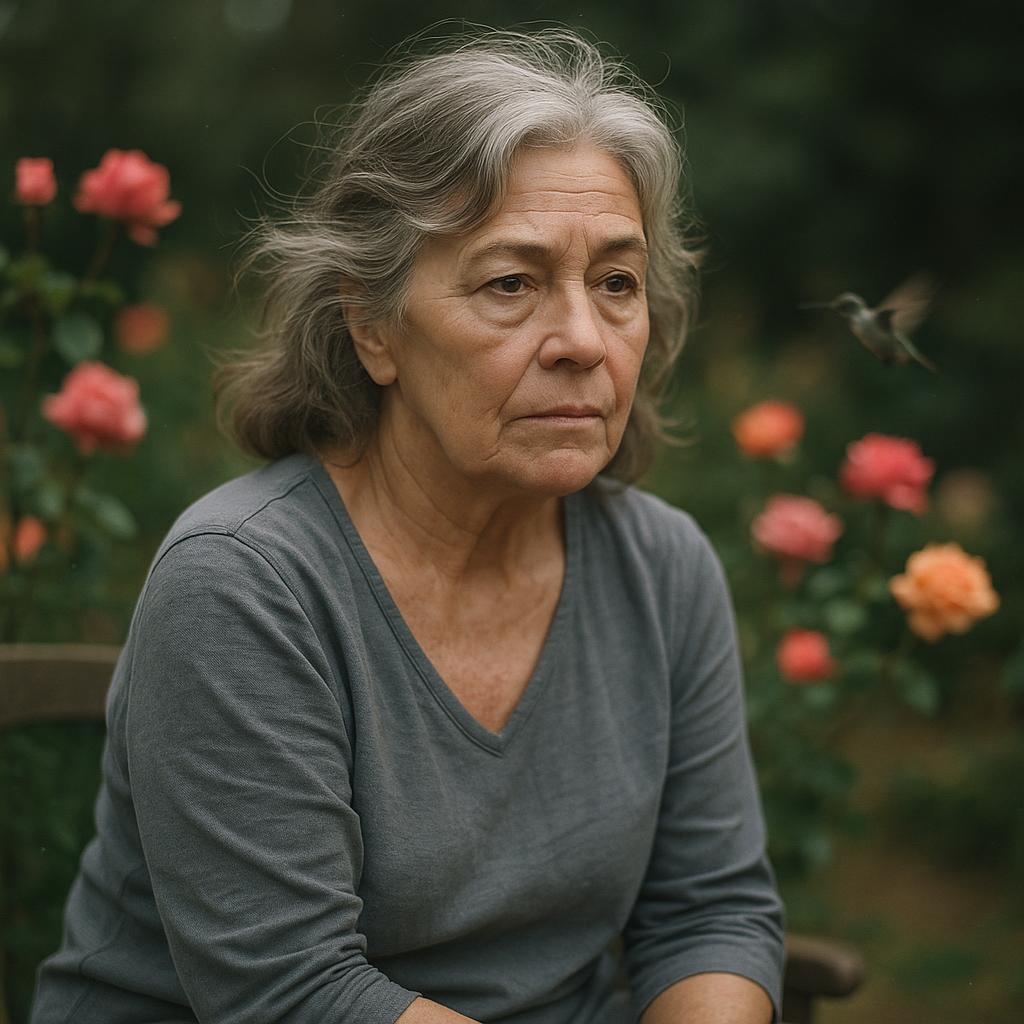 Image by RM AI
Image by RM AI
Robert's Warning
The phone rang at exactly 9:17 AM. I knew it was Robert before I even looked at the caller ID—he always called early with bad news. 'Diane,' he said, his voice carrying that lawyer-like gravity that made my stomach tighten. 'They've filed the paperwork to contest the will. All three of them together.' I sank into James's chair, feeling suddenly exhausted. 'James anticipated this,' Robert continued, his tone grim but not surprised. 'We have all the documentation we need to defend his wishes, but...' He paused, and I could practically see him removing his glasses to pinch the bridge of his nose. 'It's going to get ugly.' The silence between us stretched until he added the part he'd been hesitating to share: 'They've hired Elliot Chambers.' The name hit me like a physical blow. Chambers was notorious in our town—a shark who specialized in portraying elderly widows as confused or manipulated. My own children were not just fighting me; they were preparing to destroy my reputation to get what they wanted. 'I see,' was all I could manage, my voice surprisingly steady despite the earthquake happening inside me. What they didn't realize was that James had left me with one more card to play—one that would change everything when the time was right.
 Image by RM AI
Image by RM AI
The Family Friends
The doorbell chimed on Tuesday afternoon, and I opened it to find Martha and George standing there, concern etched into their familiar faces. These weren't just neighbors—they were friends who'd shared barbecues, holiday dinners, and thirty years of life's ups and downs with James and me. 'Diane, we need to talk,' Martha said, her voice gentle but strained. 'Mark called us yesterday. He's worried about you rattling around in this big house all alone.' I invited them in, noticing how they glanced around the living room as if searching for signs of my supposed decline. The doubt in their eyes stung worse than my children's greed—this was the collateral damage of my children's campaign. Over tea in James's favorite cups, I silently retrieved his letter from my desk drawer and handed it to them. 'Read it,' I said simply. Their expressions transformed as they absorbed James's words—Martha's hand flew to her mouth, while George's face flushed with anger. 'Those ungrateful...' he muttered, unable to finish the sentence. Martha reached across the table and squeezed my hand, tears in her eyes. 'We're so sorry, Diane. We had no idea.' What they didn't know was that their visit had just given me the courage to implement the next phase of James's plan—one that would require allies who understood the truth.
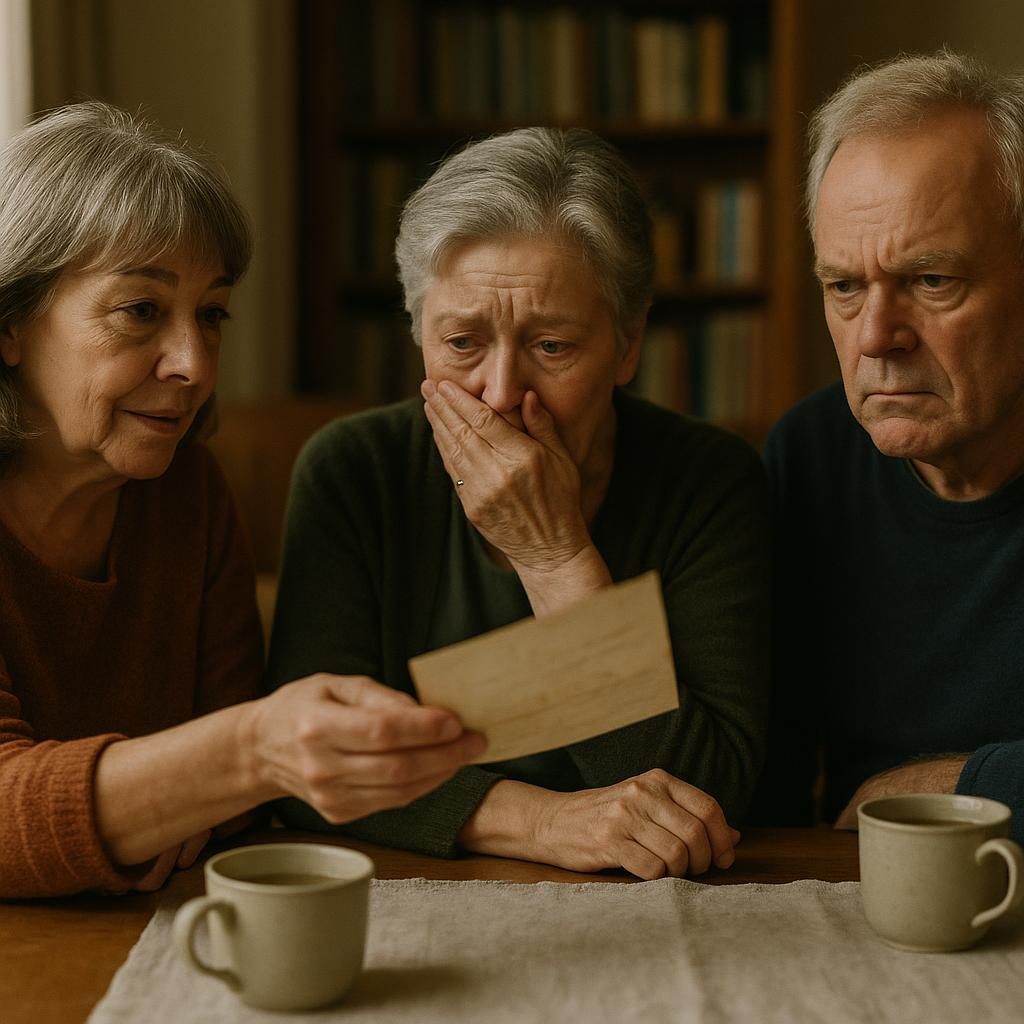 Image by RM AI
Image by RM AI
The Community Divides
Our small town quickly transformed into a battleground of whispers and sideways glances. At the grocery store, I'd catch former friends suddenly finding the cereal aisle fascinating when they spotted me. My children's digital smear campaign had worked its magic, dividing our community like Moses parting the Red Sea. Some neighbors crossed the street to avoid awkward conversations, while others showed up on my doorstep with lasagna and righteous indignation on my behalf. 'The nerve of those kids,' Elaine from the garden club huffed, setting down a casserole. 'After everything you and James did for them!' Sunday service became a special kind of torture—I could feel the weight of stares as I sat alone in the pew James and I had warmed together for thirty years. The whispers behind hymnals weren't exactly subtle. After the service, Pastor Michael approached with that careful expression people reserve for the terminally ill or recently divorced. 'Diane, my door is always open,' he offered gently. I thanked him with as much grace as I could muster but declined. This wasn't a spiritual crisis; it was a family war. And wars require strategy, not confession. What nobody realized was that James had prepared me for this exact scenario—and his final chess move was about to change everything.
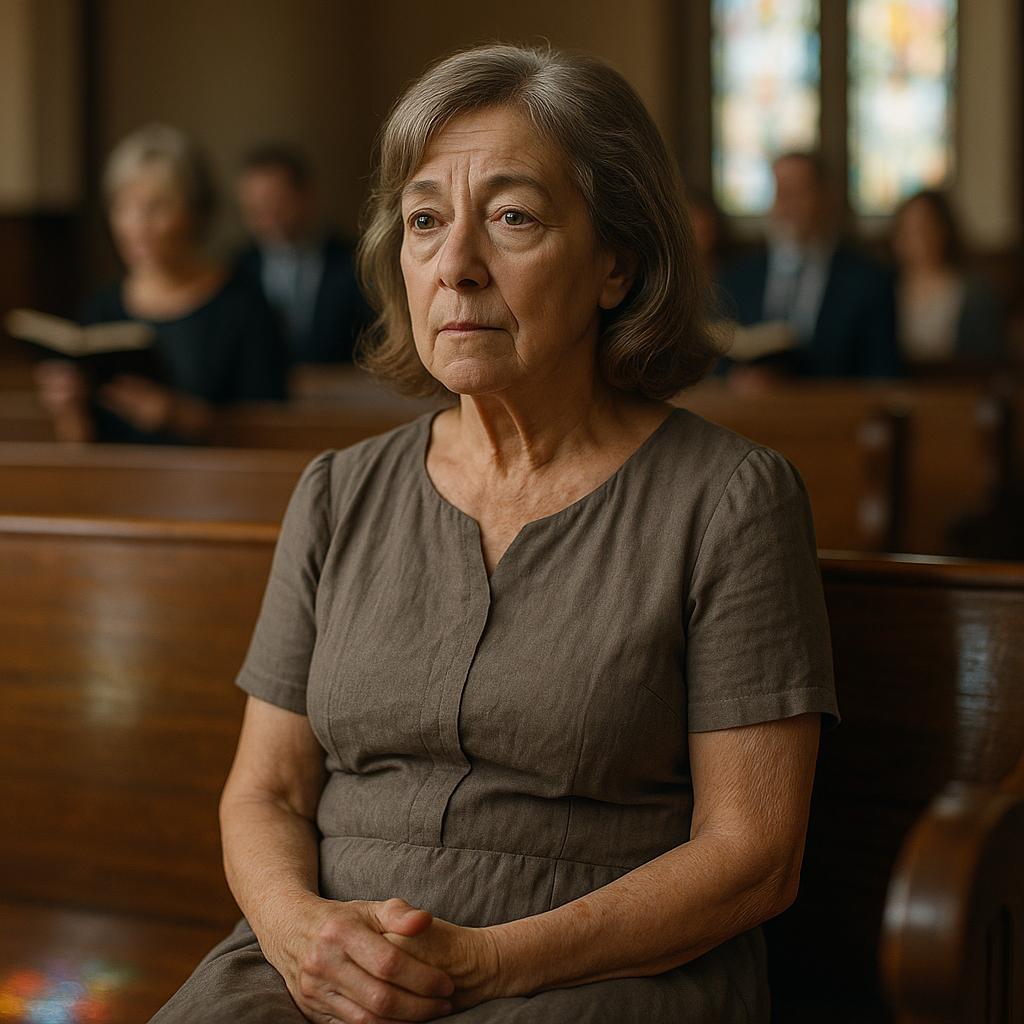 Image by RM AI
Image by RM AI
The Discovery
I never expected to find the folder. It was tucked between tax returns and insurance policies in James's meticulously organized filing cabinet—a manila envelope labeled simply 'For Diane - Evidence.' My hands trembled as I opened it, not knowing what secrets my husband had kept. Inside was a carefully documented betrayal that stole my breath. Printouts of text messages between our children, screenshots of emails, handwritten notes James had taken during doctor's appointments. 'Mark says we should just speed things along with the will,' Susan had texted Emma. 'I've already calculated what we'll each get—the house alone is worth $450K.' Another message from Emma: 'Ugh, Mom's insisting I visit Dad again. So boring watching him die. Can't they just hurry this up?' I sank to the floor of James's study, surrounded by paper evidence of our children's true characters. The timestamps showed James had been collecting this evidence for months, silently witnessing our children's callousness while fighting for his life. No wonder he'd changed his will. This wasn't spite—it was justice. I gathered the papers, wiping tears from my cheeks. James had given me one final gift: the truth I needed to stand my ground. What I didn't realize was how powerful this ammunition would be in the battle ahead.
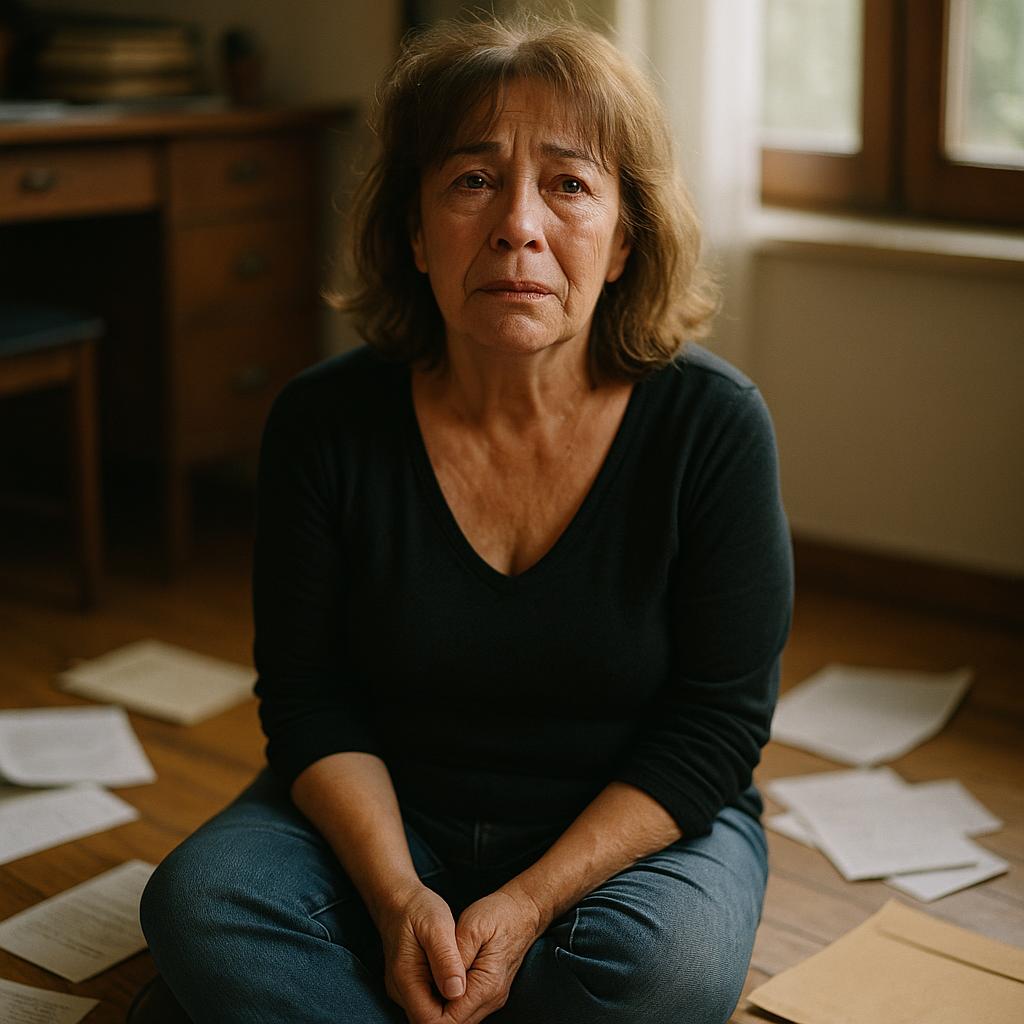 Image by RM AI
Image by RM AI
The Decision
I walked into Robert's office clutching James's folder like it contained nuclear launch codes. In a way, it did—this was the emotional equivalent of mutually assured destruction for our family. Robert's face darkened as he flipped through the pages, his professional composure slipping with each screenshot and text message. 'Good Lord, Diane,' he whispered, shaking his head at Emma's callous message about being bored watching her father die. 'This changes everything. With this evidence, their case doesn't stand a chance.' He looked up, his expression softening from lawyer to friend. 'But using this means exposing their behavior to public record. Every cruel word, every calculation of your husband's worth while he was still fighting to live—all of it becomes permanent.' I stared out his office window at the oak tree James and I had planted in the town square for our 25th anniversary. It was thriving now, providing shade for young families who had no idea of the storm raging in ours. 'Let's hold this in reserve,' I finally decided, remembering James's words about redemption. 'I want to try something first.' Robert nodded, understanding that this wasn't just about winning a legal battle; it was about what kind of mother I still wanted to be. What my children didn't realize was that the true inheritance James had left wasn't money at all—it was the chance to become better people than they'd shown themselves to be.
 Image by RM AI
Image by RM AI
The Invitation
I sat at James's antique writing desk, my hand trembling slightly as I sealed the third identical cream-colored envelope. After weeks of chaos, I was taking back control in the only way I knew how—on my terms. The letters to Mark, Susan, and Emma were simple but deliberate: dinner at our family home on Saturday, no lawyers, no social media theatrics, just us. 'I have a proposal regarding your father's estate,' I wrote, knowing those words would be impossible for them to resist. Their responses arrived with predictable speed—Mark called within minutes, his voice overly casual as if we were just catching up; Susan sent a formal email peppered with questions about who else would attend (always calculating the room); and Emma, true to form, simply texted a thumbs-up emoji. I placed their responses in James's folder, a sad smile crossing my face. Even now, they couldn't see me as their grieving mother who had lost her partner of forty-two years—just a stubborn obstacle between them and what they believed they deserved. As I gazed at our family portrait on the mantel, taken when the children still had innocence in their eyes, I wondered if they had any idea what I was about to put on the table. James always said timing was everything, and his final lesson was about to be served.
 Image by RM AI
Image by RM AI
Preparing the House
I spent the entire day in the kitchen, my hands moving through familiar motions as I prepared each of my children's favorite dishes. James and I used to joke that our kids' personalities showed in their food preferences—Mark's hearty pot roast, substantial and traditional; Susan's elegant salmon, always perfectly presented; and Emma's vegetarian lasagna, her rebellion against family traditions packaged in layers of pasta. I deliberately set the table with our everyday dishes—the ones with tiny chips and faded patterns from thousands of family meals. The fine china James's mother had left us stayed in the cabinet. This wasn't about impressing them; it was about reminding them. At each place setting, I tucked a photograph I'd spent hours selecting from our albums. Mark triumphantly holding his baseball trophy at eleven, Susan curtseying in her first recital tutu, Emma beaming beside her science fair volcano. I ran my fingers over their younger faces, wondering when exactly the light in their eyes had been replaced by dollar signs. As I lit the candles and adjusted the flowers—daisies from our garden, not store-bought arrangements—I rehearsed what I would say when they arrived. James had prepared me for this moment, but nothing could prepare me for seeing the adults my children had become walk through the door of the home where I'd raised them with such different hopes.
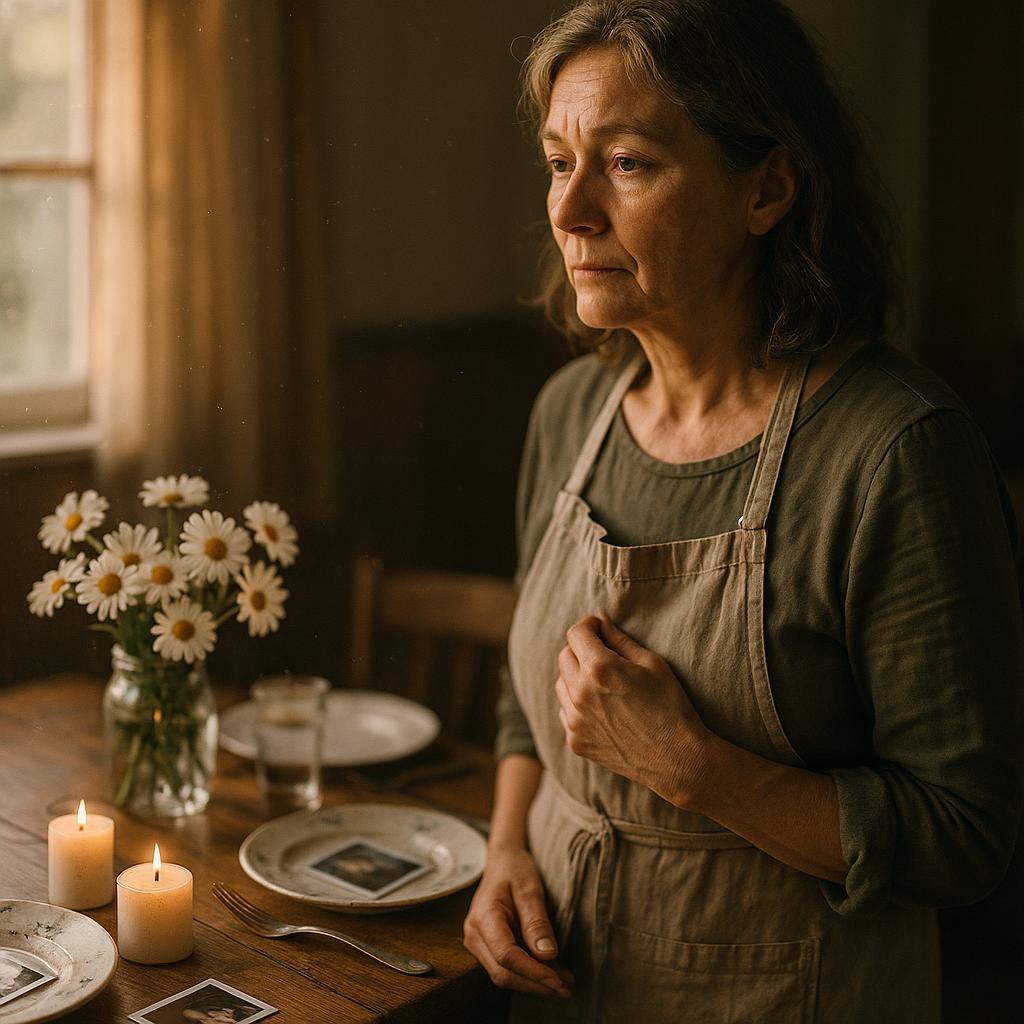 Image by RM AI
Image by RM AI
The Arrival
The doorbell chimed at exactly 6:30 PM. I smoothed my dress and took a deep breath before opening the door. Mark arrived first, his expensive cologne announcing him before his stiff hug did. 'Mom,' he said with that artificial warmth I'd grown to recognize. Susan pulled up just minutes later in her BMW, checking her reflection in her compact before approaching the house. Emma was last, of course, her eyes glued to her phone as she walked up the driveway, nearly tripping on the step I'd warned her about a thousand times growing up. The air felt electric with tension as they filed into the dining room, their eyes darting around the house like appraisers at an estate sale. 'I made all your favorites,' I said, gesturing to the table where I'd placed their childhood photos. Mark immediately flipped his face-down, as if the image of his innocent eleven-year-old self was an accusation. Susan studied hers with clinical detachment, while Emma—true to form—snapped a picture of hers with her phone, no doubt crafting some heartstring-tugging caption for her followers. 'Shall we sit?' I asked, watching their faces carefully. None of them had any idea what was coming next, and for the first time since James died, I felt a flicker of something that wasn't grief. It was power.
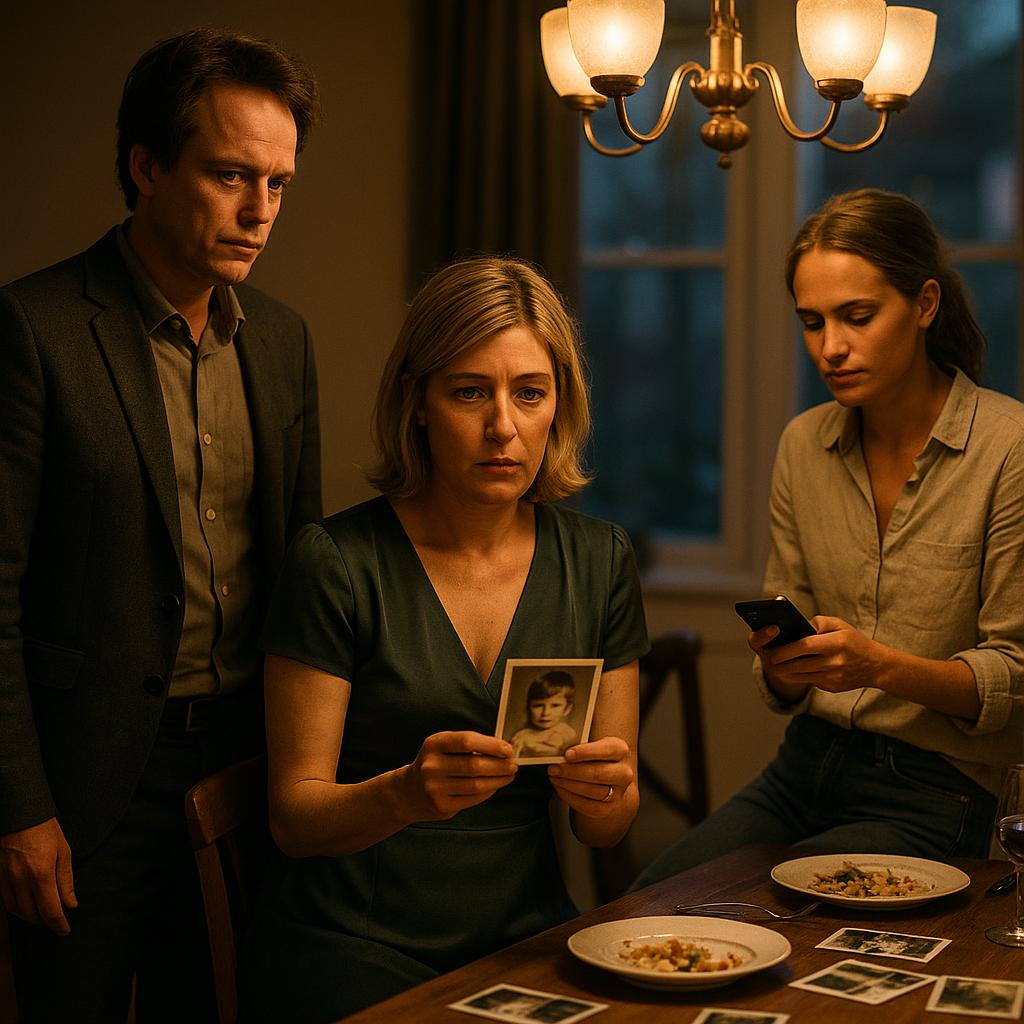 Image by RM AI
Image by RM AI
The Uncomfortable Dinner
The dinner table felt like a stage, and we were all terrible actors. I watched as my children picked at the food I'd spent hours preparing, offering compliments that rang as hollow as their concern. 'The pot roast is amazing, Mom,' Mark said, his eyes darting to the folder I'd placed beside my plate. Susan nodded enthusiastically, her fork barely touching her salmon as she asked about my 'self-care routine' with practiced sympathy. Emma occasionally looked up from her phone to mumble agreement, photographing her untouched lasagna 'for memories.' The conversation bounced between weather, neighborhood gossip, and carefully edited versions of their lives—Susan's promotion (but not her divorce proceedings), Mark's new house (but not his mounting debt), Emma's growing social media following (but not her failed job interviews). The charade continued until Mark, never one for patience, finally cleared his throat. 'So, Mom,' he said, setting down his fork with a clink that silenced the room, 'your letter mentioned a proposal about Dad's estate?' Susan kicked him under the table—I could tell by his wince—while Emma suddenly became fascinated with her water glass. I took a slow sip of wine, looking at these strangers wearing my children's faces, and felt a strange calm settle over me. 'Yes,' I said, reaching for the folder. 'Your father left me one last gift before he died. I think it's time you saw exactly what it was.'
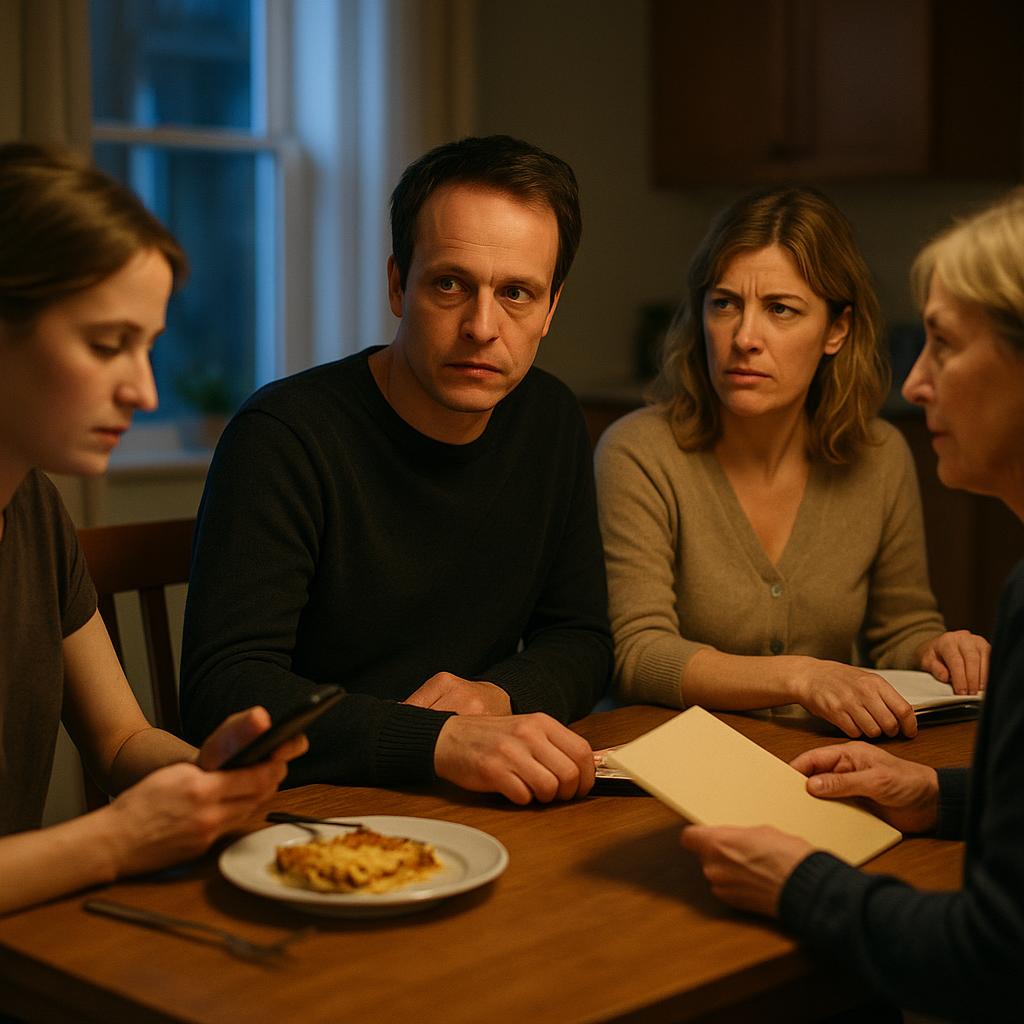 Image by RM AI
Image by RM AI
The Proposal
I slid the folder to the center of the table and watched their faces. 'Your father left me everything because he saw how money had changed you,' I said, my voice steadier than I expected. 'But he also left me the option to help you find your way back.' The silence was deafening as I explained James's final gift—a conditional trust. Each of them would receive a significant inheritance, but only after completing specific requirements tailored to their individual failings. Mark's jaw tightened when I told him about his year of weekly service at the homeless shelter. Susan's perfectly manicured nails dug into her palms as I outlined her assignment to provide pro bono image consulting for women entering the workforce after hardship. Emma finally put her phone down completely when I explained she'd need to disconnect from social media entirely and teach digital literacy to seniors. 'This isn't fair,' Mark started, but I raised my hand to silence him—a gesture that had worked when he was ten and surprisingly still did at forty-three. 'This isn't about fair,' I replied. 'It's about becoming the people your father always believed you could be.' What they didn't realize as they exchanged panicked glances was that their reactions in the next few minutes would tell me everything I needed to know about whether James's plan could actually save our family.
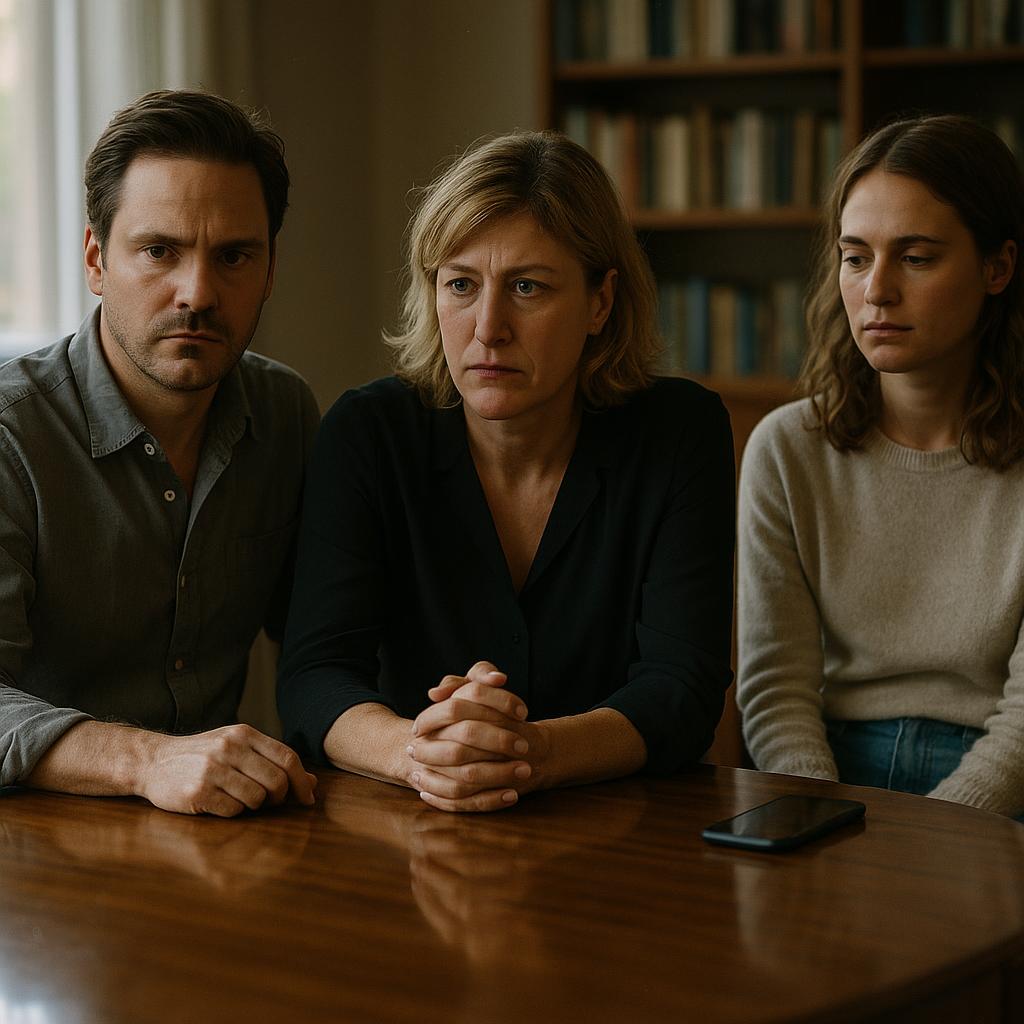 Image by RM AI
Image by RM AI
The Reactions
The silence that followed my proposal lasted only seconds before erupting into chaos. Mark's incredulous laugh cut through the air first. 'You expect me to work with homeless people for a year? I'm an executive, Mom, not a soup kitchen volunteer!' Susan's perfectly plucked eyebrows shot up so high they nearly disappeared into her hairline. 'Pro bono work? With my schedule?' she scoffed, as if I'd suggested she fly to the moon. 'Do you have any idea how many billable hours that would cost me?' Emma's reaction was the most visceral—genuine panic flashed across her face as her fingers instinctively clutched her phone tighter. 'I can't leave social media—it's literally my job!' she protested, her voice cracking. 'I'd lose all my followers!' I sat quietly, sipping my wine, letting them vent their objections one after another. It was fascinating, really, watching them reveal exactly why James had created these specific conditions. Not one of them recognized these tasks as opportunities for growth rather than punishments. When they finally exhausted themselves, a heavy silence fell over the dining room. I set down my glass and looked at each of them in turn. 'The choice is yours,' I said simply. 'The trust will remain available for five years.' What I didn't tell them was that James had left one final condition—one that would change everything if they failed this test.
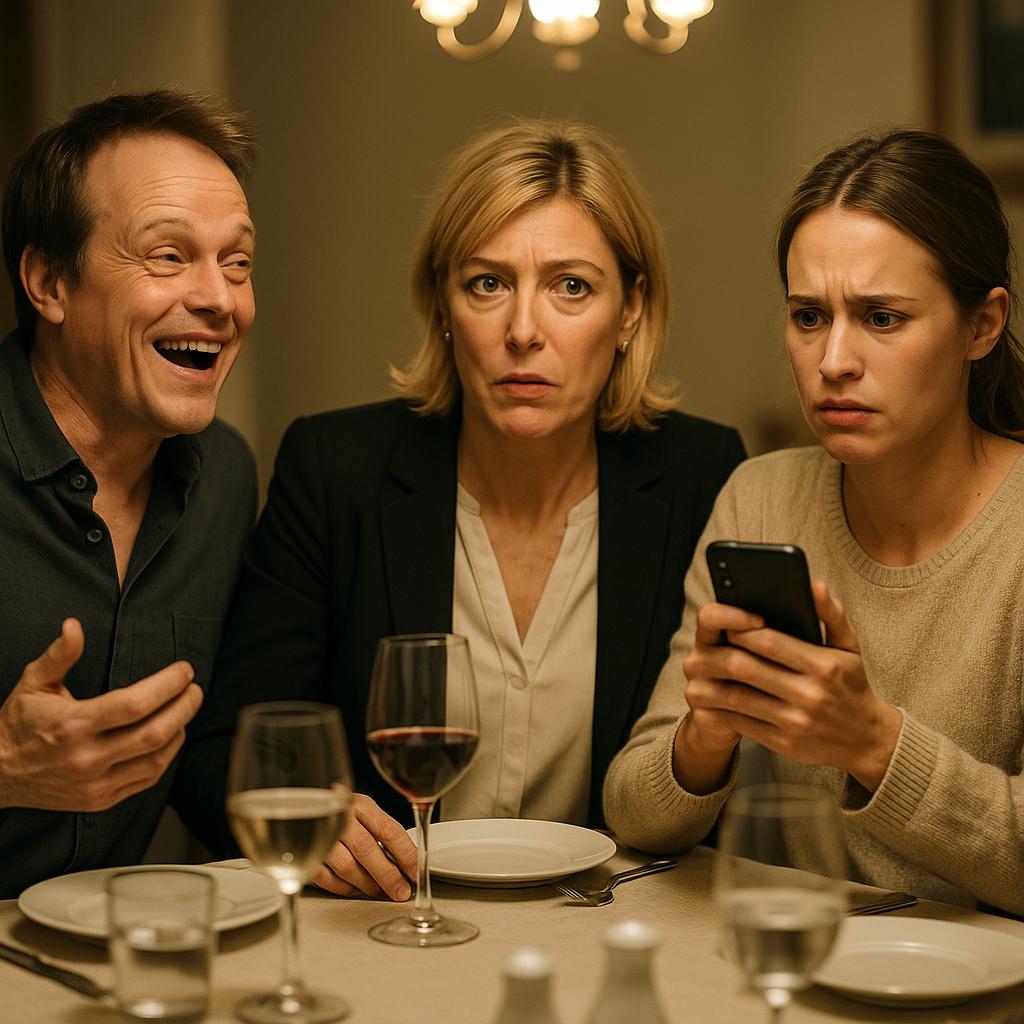 Image by RM AI
Image by RM AI
The Ultimatum
Mark's question hung in the air like a challenge. 'And if we refuse?' he asked, his voice as cold as the untouched food on his plate. I met his gaze steadily, channeling James's strength. 'Then you receive nothing, and the estate eventually goes to charity.' I watched Susan's lawyer instincts kick in immediately—her posture straightened, eyes narrowing as she calculated her next move. 'We could still contest the will,' she said, tapping her manicured nails against her wine glass. I nodded calmly, remembering the folder of evidence tucked safely in Robert's office. 'You could try. But your father was very thorough in documenting his decisions—and your behaviors.' Something in my tone must have struck a nerve because Emma suddenly shifted uncomfortably, her phone face-down for once. 'This is emotional blackmail,' she muttered, unable to meet my eyes. 'No,' I corrected gently, feeling a strange mix of sadness and resolve. 'This is parenting. Something your father and I should have done better when you were younger.' The silence that followed was deafening. I could almost see the calculations running behind their eyes—weighing their greed against their comfort, their inheritance against their pride. What they didn't realize was that this ultimatum wasn't just about money; it was James's final attempt to save their souls.
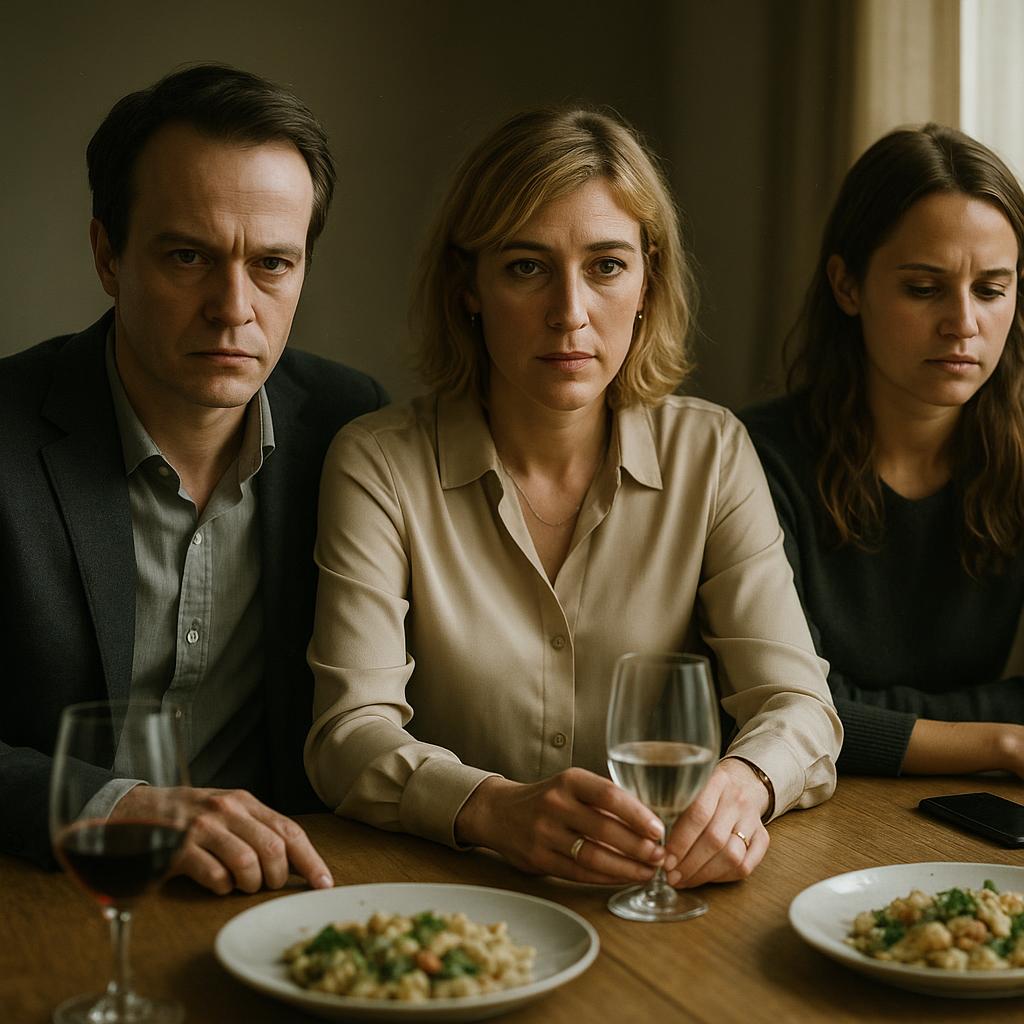 Image by RM AI
Image by RM AI
The Departure
I stood in the doorway watching my children leave, one by one, like strangers departing from a business meeting gone sour. Mark was first, storming out with the same temper he'd had since he was five, slamming the door so hard that James's fishing trophy wobbled on the shelf. The family photos on the wall rattled in their frames, as if even their glass-preserved younger selves were shocked by what they'd become. Susan followed with that ice-queen composure she'd perfected in law school, her parting words dripping with legal threats: 'Richard will review the legality of these conditions.' No goodbye, no hug—just the promise of more litigation. Emma lingered the longest, hovering in the doorway like the uncertain teenager she once was. 'Did Dad really think we were such terrible people?' she asked, her voice suddenly stripped of its usual indifference. I saw a flicker of my real daughter in her eyes. 'No,' I told her, feeling a strange mix of heartbreak and hope. 'He thought you were lost people who could still find your way back.' She nodded slightly before walking to her car, her phone—for once—nowhere in sight. As I closed the door behind them, I wondered if James had been right about the power of his final lesson. The house felt emptier than ever, but somewhere in that emptiness, I felt the first fragile seed of possibility taking root.
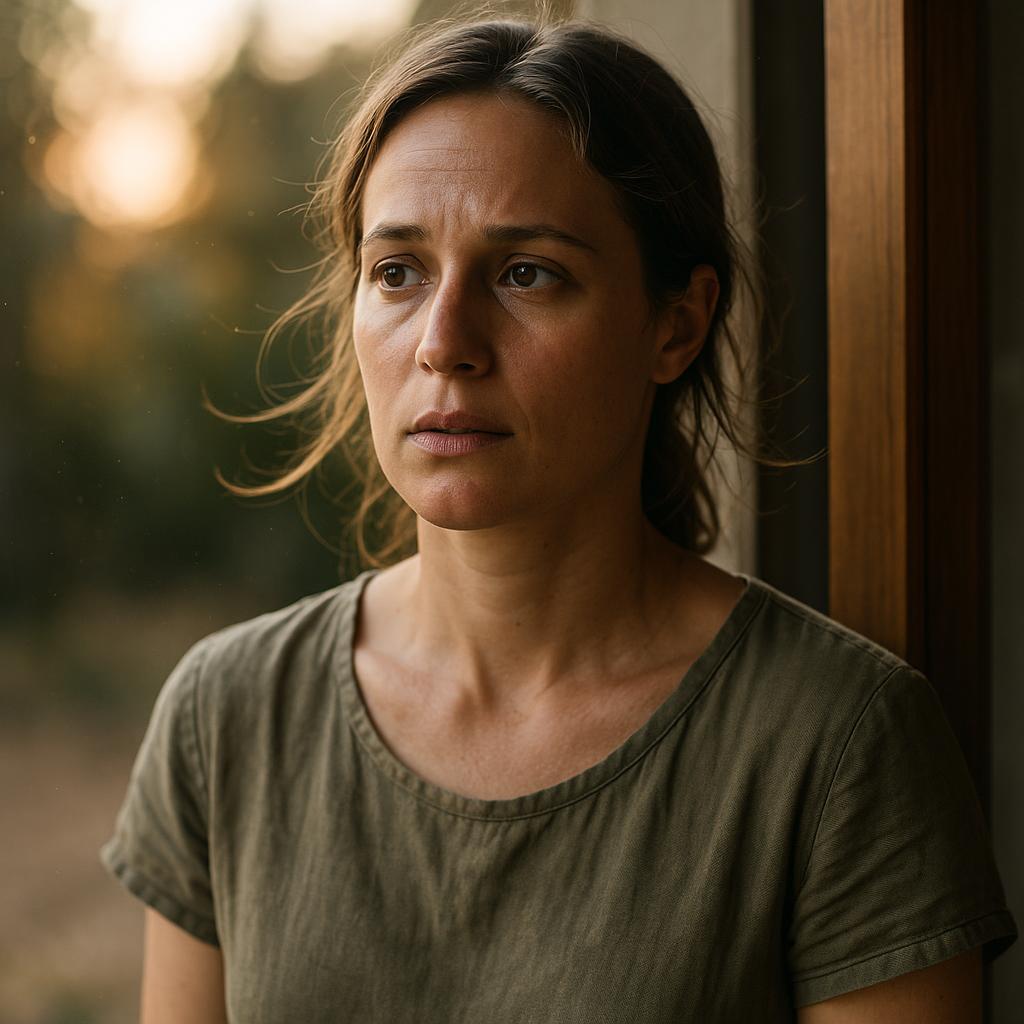 Image by RM AI
Image by RM AI
The Silence Returns
Three weeks passed in a silence so loud it echoed through every room of our house. My phone remained stubbornly quiet, save for one text from Emma that simply read, 'thinking about what you said.' I stared at those five words for longer than I care to admit, searching for hidden meanings like a detective with a cryptic clue. Mark and Susan, meanwhile, had gone completely dark—no calls, no texts, not even angry voicemails. I filled my days with the rhythms James and I had established over decades: Tuesday mornings shelving books at the library, Thursday coffee with Martha and George (who tactfully avoided asking about 'the situation'), Sunday services where I prayed for wisdom rather than victory. Robert called weekly with his lawyer's precision. 'They've withdrawn the contest,' he informed me, his voice carefully neutral. 'But they haven't accepted the trust conditions either. They're in calculation mode, Diane—weighing if the inheritance is worth the personal cost.' I wasn't surprised. My children had always been excellent at math, especially when the equation involved their own benefit. What they hadn't calculated, however, was that this silence was giving me something unexpected: peace to realize I could survive whatever choice they made. What I never anticipated was who would break the silence first—or how.
 Image by RM AI
Image by RM AI
The Unexpected Visitor
The doorbell rang on a rainy Tuesday afternoon, exactly one month after the disastrous dinner. I wasn't expecting anyone, so I approached cautiously, peering through the peephole. My heart skipped when I saw Emma standing there—no phone in her hand, no perfectly curated outfit, just my youngest daughter looking surprisingly vulnerable without her usual armor of filters and makeup. When I opened the door, she didn't immediately speak, just stood there with raindrops clinging to her hair. 'Can I come in?' she finally asked, her voice small and hesitant. Over chamomile tea—the same kind I used to make when she had nightmares as a child—Emma's carefully constructed facade crumbled completely. 'I didn't even look up from my phone when Dad was trying to tell me goodbye,' she confessed, tears streaming down her face, smudging what little makeup she wore. 'I was posting about being at the hospital instead of actually being there.' Her pain was raw and real—the first genuine emotion I'd seen from any of my children in years. She clutched the mug like it was anchoring her to reality. 'I want to do the trust thing,' she said finally, meeting my eyes. 'Not for the money. For me.' I reached across the table and took her hand, feeling something I hadn't felt in a long time: hope. What I didn't know then was that Emma's return would set off a chain reaction that none of us could have predicted.
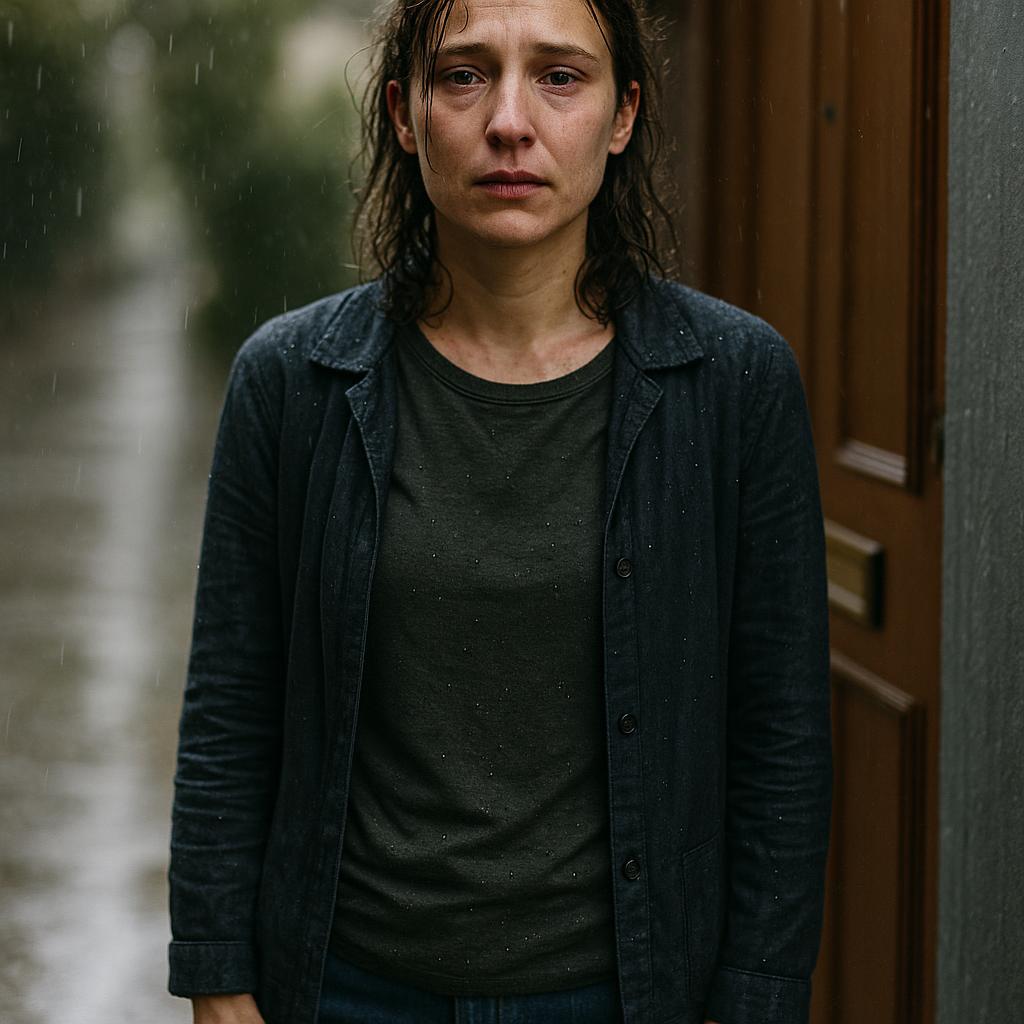 Image by RM AI
Image by RM AI
Emma's First Step
Emma's social media farewell post nearly broke the internet—or at least her small corner of it. 'Taking a digital detox for personal growth,' she wrote, carefully omitting any mention of inheritance conditions or her father's passing. Within hours, her comment section exploded with everything from support to conspiracy theories. 'Is someone forcing you offline?' one follower demanded. 'Blink twice if you need help!' I couldn't help but smile at the irony—they thought I was the villain in her story, never suspecting I was trying to save her from herself. The next morning, Emma arrived at the Oakridge Senior Center clutching her laptop like it was a life preserver. I watched from the doorway as she nervously scanned the room of curious seniors, their weathered faces a stark contrast to the filtered perfection she was used to. 'I'm Emma,' she began, her voice barely audible. Then something shifted. She straightened her shoulders and continued more confidently, 'And I'm going to help you connect with your families online.' As she demonstrated how to video call grandchildren, I noticed something I hadn't seen in years—my daughter was actually making eye contact with people. What surprised me most wasn't her growing confidence but the moment I caught her putting her phone face-down when an elderly man asked for help. It was a small gesture, but in that moment, I glimpsed the daughter I thought I'd lost forever.
 Image by RM AI
Image by RM AI
Mark's Reluctant Decision
Two weeks after Emma's surprising turnaround, my phone rang at 9:30 PM. I recognized Mark's number immediately. My heart raced as I answered, wondering what new accusations he might hurl my way. 'Fine. I'll do the homeless shelter thing,' he said without preamble, his voice tight with barely contained frustration. 'Just have the paperwork ready.' I thanked him calmly, not mentioning his obvious reluctance or asking what had changed his mind. Robert later informed me that Mark's investment firm was struggling—apparently, his 'foolproof' ventures weren't so foolproof after all. Without access to what he considered 'his inheritance,' bankruptcy loomed like a shadow over his carefully constructed image of success. The following Tuesday, I found myself driving past St. Michael's Shelter at 6 PM—his scheduled volunteer time. I hadn't planned to check on him, but curiosity got the better of me. There it was—his gleaming black Mercedes parked between a rusted pickup and a dented station wagon, looking as out of place as a peacock in a chicken coop. I slowed down just enough to see him standing awkwardly at the entrance, his expensive suit jacket already removed, his sleeves reluctantly rolled up. He looked like a man preparing for battle rather than service. What I couldn't have known then was that the battle Mark was about to face wasn't with the shelter's residents—it was with the man he'd become.
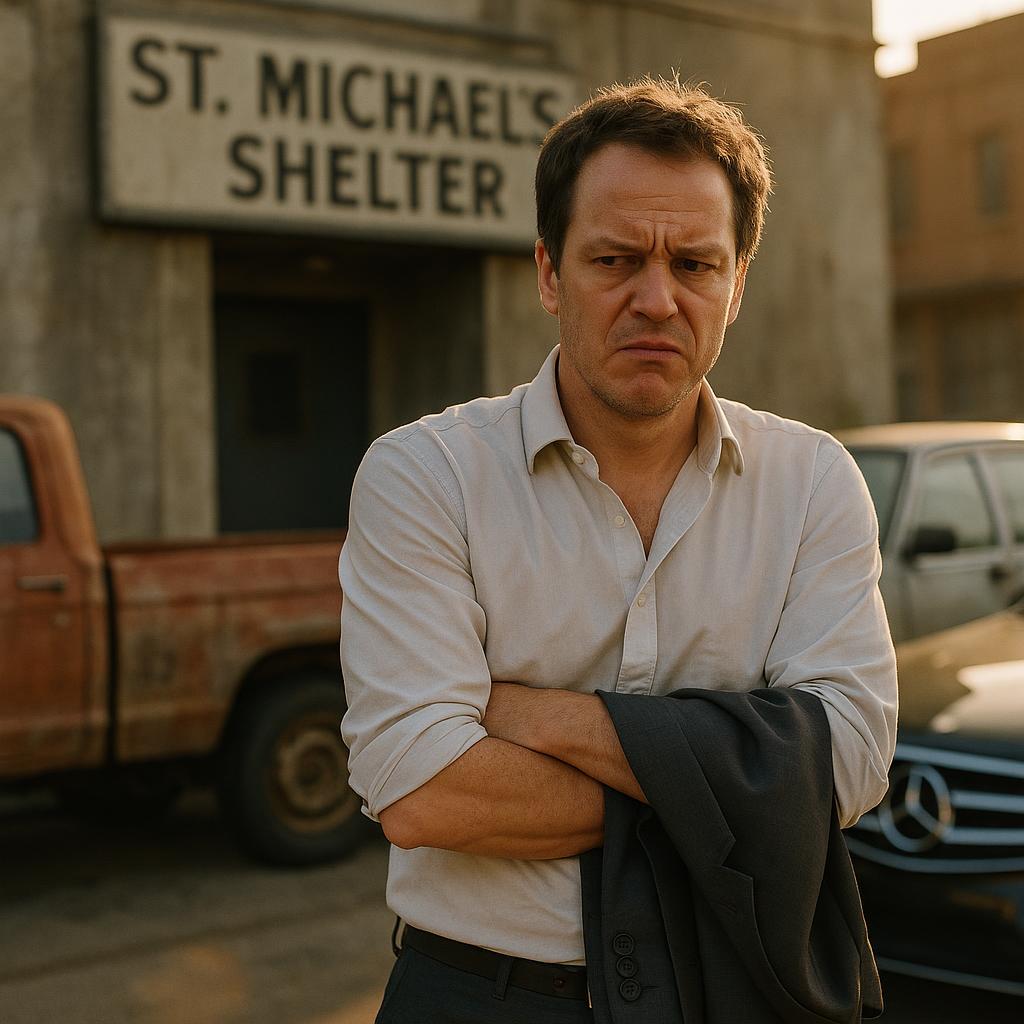 Image by RM AI
Image by RM AI
Susan's Resistance
While Emma was teaching seniors and Mark was reluctantly serving soup, Susan remained entrenched in her resistance. My middle child—always the strategist—had transformed her social media into a masterclass in manipulation. Suddenly, her Instagram was flooded with perfectly staged family photos, captions dripping with phrases like 'family values' and 'honoring our elders.' She even posted a throwback photo of herself with James, writing, 'Missing Dad, who taught me everything about responsibility.' I almost laughed at the irony. Martha called me Tuesday morning, her voice lowered as if sharing state secrets. 'Diane, Susan's been asking everyone about you—whether you seem confused lately, if you're taking any medications, if anyone's been 'influencing' your decisions.' I sighed, unsurprised. Robert had warned me this might happen—a capacity challenge was the only legal avenue left. 'She's building a case that I'm incompetent,' I told Martha calmly. What Susan didn't realize was that James had anticipated this exact move. He knew our daughter better than she knew herself, which is why he'd left behind a series of videos addressing each potential challenge she might make—including questioning my mental capacity. The real question wasn't whether Susan would eventually back down, but what would happen when she discovered the final surprise James had left specifically for her.
 Image by RM AI
Image by RM AI
The Evidence Folder
Robert's call came on a Tuesday morning, his voice carrying that careful lawyer tone I'd come to recognize. 'Diane, it's time to use the folder. Susan's building a case against you.' I felt a heaviness in my chest but nodded to myself, knowing this day would come. James had prepared for this—meticulously documenting every cruel text, every callous email where Susan had referred to me as 'the old lady' and discussed 'speeding up inheritance matters' while he was still fighting for his life. I gave Robert permission with a quiet 'Do it,' and by afternoon, selected documents had been delivered to Richard's office. The response was swift and dramatic. My doorbell rang at 7:30 that evening, and through the peephole, I saw Susan—not the polished, controlled daughter who normally appeared in public, but a woman whose perfect facade had completely crumbled. When I opened the door, she didn't step inside, just stood there trembling. 'How did you get those messages?' she demanded, her voice cracking. I met her gaze steadily. 'Your father saved everything, Susan. Every word. He saw everything.' For the first time in years, I watched real emotion cross her face—not anger over money or frustration at inconvenience, but genuine fear. Not fear of losing her inheritance, but something far more devastating: the fear of being truly seen for who she'd become. What she didn't know was that the folder contained much more than what Robert had revealed—and her reaction now would determine how much more she would have to face.
 Image by RM AI
Image by RM AI
Susan's Surrender
Two days after the evidence folder bombshell, my phone rang. I almost didn't answer when I saw Susan's name, bracing myself for another legal threat. Instead, her voice came through subdued, stripped of its usual courtroom confidence. "I'll do the pro bono work," she said flatly. Then, after a pause that felt like it contained years of unsaid things: "And... I'm sorry, Mom." The apology hung in the air between us—genuine but incomplete, like a partially assembled piece of furniture. Sorry for being caught, perhaps, more than sorry for her actions. Still, it was the first crack in her perfect facade, and I'd take it. When we met to discuss arrangements with the women's shelter director the following week, I mentioned that many clients needed interview outfits and confidence coaching. Something flickered across Susan's face then—a spark of genuine interest that had nothing to do with inheritance money. "I could build a whole capsule wardrobe system for them," she said, almost to herself, her legal notepad suddenly filled with sketches instead of arguments. "Maybe even get some of my designer contacts to donate pieces." For a brief moment, I glimpsed the passionate daughter who used to dress her dolls in hand-sewn outfits before ambition and appearances consumed her. What Susan didn't realize was that her father had predicted exactly this moment—right down to which part of the assignment would finally reach her heart.
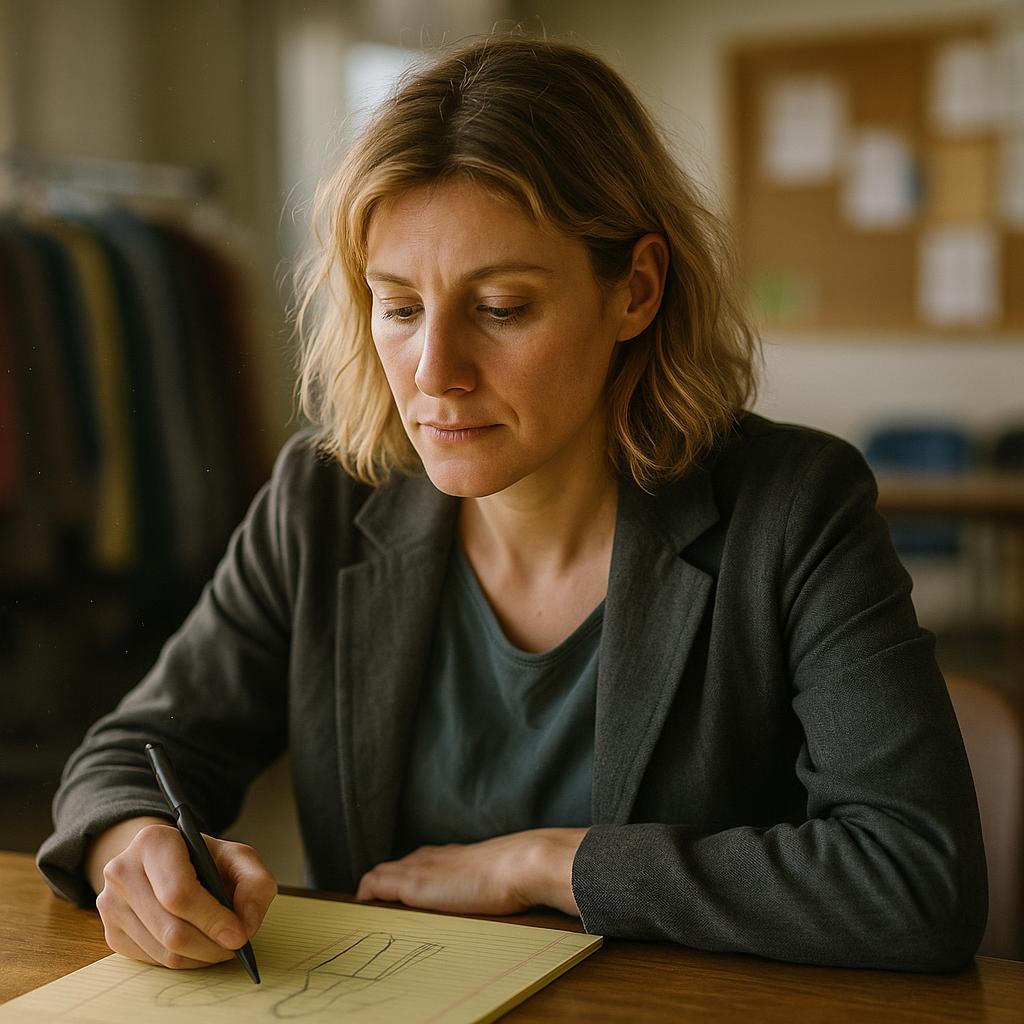 Image by RM AI
Image by RM AI
Three Months Later
Three months into this strange experiment of James's, I found myself sitting in my garden, flipping through photos on my phone of Emma teaching Mrs. Abernathy how to video chat with her grandson in Australia. 'She cried, Mom,' Emma had told me, her voice filled with something I hadn't heard in years—genuine emotion. Mark's transformation was more subtle but no less remarkable. He'd gone from grudgingly serving whatever canned soup the shelter had available to bringing in quality ingredients and organizing proper meals. 'Your son's got quite the eye for detail,' Martha's husband Tom had reported after volunteering alongside him. 'He's teaching some of the men basic financial literacy now.' Even Susan, my ice queen, had thawed enough to leverage her connections, convincing her designer friends to donate professional clothing for women at the shelter. 'These women deserve to feel confident,' she'd said during our last coffee meeting, sounding almost like the passionate daughter I remembered. I set my phone down and looked up at the sky, wondering if James could see what was happening. These were small steps, yes, but in the right direction. What none of my children realized yet was that the real inheritance had nothing to do with money at all—and that James had left one final revelation that would change everything.
 Image by RM AI
Image by RM AI
The First Family Dinner
I sent the dinner invitations with shaking hands, half-expecting rejection. But six months after that devastating will reading, all three of my children agreed to Sunday dinner. Emma arrived first, twenty minutes early with a homemade pie. 'I thought I'd help set up,' she said, reaching for plates without being prompted. The Emma who couldn't look up from her phone was gone. Mark arrived next, clutching a bottle of Merlot—my favorite, not his. 'Remembered you like the dry stuff,' he mumbled, the closest thing to thoughtfulness I'd seen from him in years. When Susan's car pulled up, I braced myself for cold formality. Instead, her children burst through the door, wrapping their arms around my legs with cries of 'Grandma!' that brought tears to my eyes. Around the table, something miraculous happened. They talked about Mr. Jenkins at the senior center who'd reconnected with his daughter after Emma's help, and the homeless veteran Mark had helped secure an apartment. Susan described a domestic violence survivor who'd aced a job interview in one of the donated suits. 'You should have seen her face, Mom,' she said, her eyes bright with genuine emotion. Not once did anyone mention the inheritance or the conditions. As I looked around at my children—really seeing them again—I wondered if James had known all along that the money was never the real inheritance he was leaving behind.
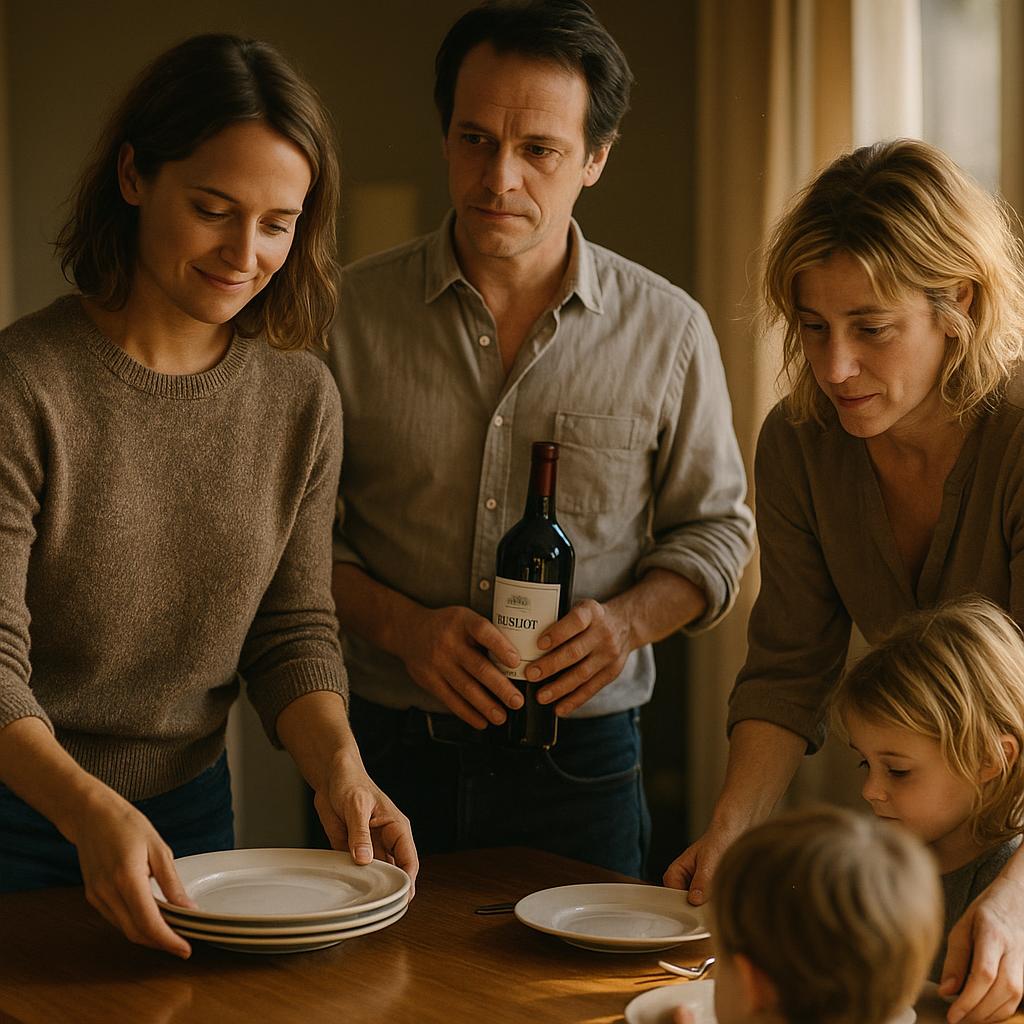 Image by RM AI
Image by RM AI
One Year Anniversary
One year. It felt impossible that 365 days had passed since James left us, yet here we were, standing together at his grave. The morning was crisp, the kind James would have called "perfect sailing weather." I watched my children place flowers on their father's headstone, and the difference from last year struck me like a physical blow. Emma wasn't documenting the moment for her followers—her phone remained tucked away in her purse. Mark stood quietly, his usual impatience replaced with stillness. Susan's grief wasn't the carefully orchestrated performance it had been at the funeral; her tears were private, real. Back at the house, they lingered over the photo albums I'd set out on the coffee table. "I'd forgotten how much Dad loved sailing," Mark said, tracing his finger over a sun-faded picture from our trip to Maine. "He was happiest on the water," I replied, my voice catching. "Remember how he'd quote that ridiculous pirate movie whenever we'd set sail?" Emma asked, and suddenly we were all laughing through tears. For a precious afternoon, we weren't a family divided by greed and resentment—we were simply people who had loved the same man, finding our way back to each other through shared memories. What none of us realized was that James had planned for this moment too, and tomorrow would bring the final piece of his elaborate puzzle.
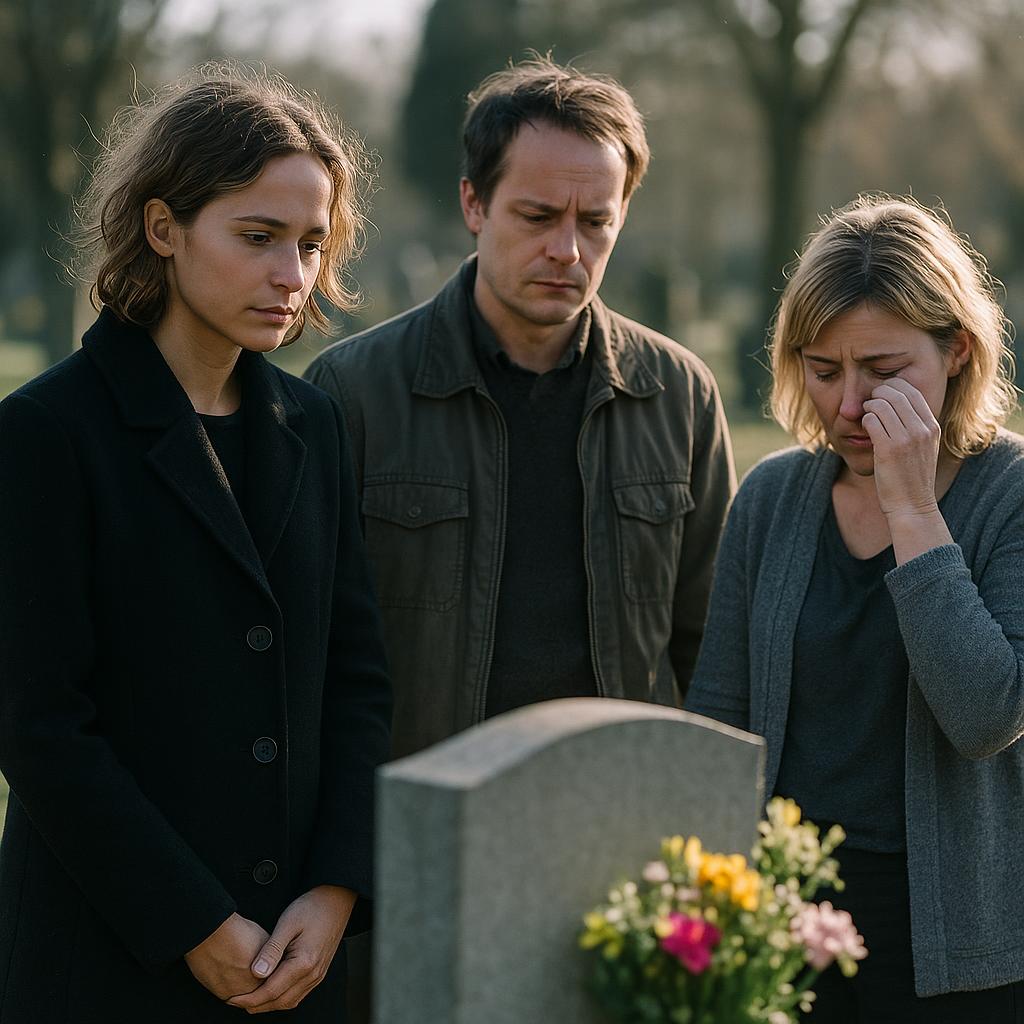 Image by RM AI
Image by RM AI
The Unexpected Decision
Robert's office felt different this time—less like a battleground and more like a family meeting room. As the one-year mark approached, I'd expected my children to collect their inheritance and retreat back to their lives. Instead, Emma had called us all together, and the nervousness in her voice made my heart flutter with uncertainty. When we gathered around Robert's mahogany table, Emma didn't waste time. 'I don't want to stop teaching at the senior center,' she announced, her eyes bright with purpose. 'I'd like to use part of my inheritance to expand the program.' The silence that followed wasn't tense—it was thoughtful. Mark and Susan exchanged glances that spoke volumes, a silent communication I hadn't seen since they were teenagers plotting to stay out past curfew. Then Mark cleared his throat. 'I've been thinking something similar about the shelter's meal program,' he admitted, his usual bravado replaced with quiet conviction. Susan nodded, adding that she was developing a mentorship component for her women's program. 'They need more than just clothes to succeed,' she explained. Robert looked at me over his glasses, a small smile playing at his lips—the same knowing look James used to give me when one of his plans came together perfectly. What none of us realized then was that James's final lesson wasn't just about giving back—it was about what would happen when the year of obligation ended and true choice began.
 Image by RM AI
Image by RM AI
The New Trust
Robert's office felt different today—warmer somehow, as if the very walls knew we were making something right. The four of us gathered around his polished conference table, signing papers that would transform James's inheritance into something none of us had imagined a year ago: The Winters Family Foundation. 'This structure allows each of your initiatives to grow while providing reasonable salaries,' Robert explained, sliding documents across to each of my children. I watched their faces as they signed—no trace of the greed that had consumed them at the will reading. Emma's eyes shone with purpose as she outlined expanded tech programs for seniors. Mark spoke confidently about nutrition education for shelter residents. Susan sketched plans for a mentorship network on a legal pad. As I signed the final document, I felt James's presence so strongly I almost turned to look for him. 'Dad would have liked this,' Emma said softly, as if reading my thoughts. Mark nodded, his expression thoughtful. 'He always said money was only worth what you did with it.' Susan reached across the table and took my hand—a gesture so unexpected I nearly gasped. 'Thank you for not giving up on us, Mom,' she said, her eyes sincere for perhaps the first time in years. 'Even when we deserved it.' What none of us realized then was that James had left one final letter—one that would reveal the true reason behind everything he'd done.
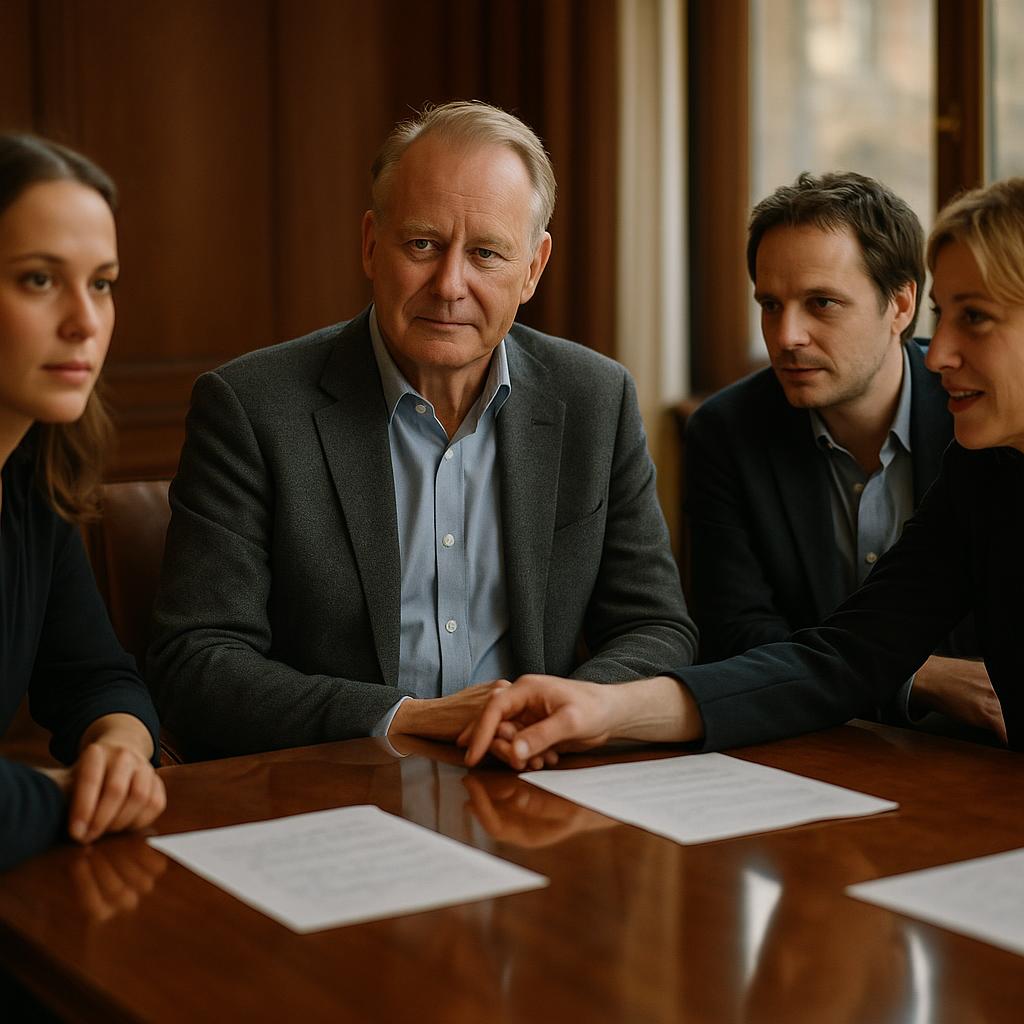 Image by RM AI
Image by RM AI
Full Circle
Two years after James's passing, I find myself standing in our living room—the one he painted himself because he refused to pay 'highway robbery prices' for professionals. The house feels different now. Not empty, as I'd feared, but full of something I never expected to find again: peace. My children visit regularly, their cars filling the driveway on Sunday afternoons not because of obligation or inheritance conditions, but because they want to be here. Last weekend, all three arrived for dinner—Emma bringing her new boyfriend (a kind social worker who looks at her, not his phone), Mark with homemade bread from a recipe he learned while volunteering, and Susan with her children who now call me 'Grandma' without being prompted. As we gathered around our old oak table—the first piece of furniture James and I purchased as newlyweds—I watched my family pass dishes and share stories. The foundation they created has grown beyond anything we could have imagined, touching hundreds of lives across the community. In that moment, I felt James's presence so strongly I almost set a plate for him. He'd orchestrated this miracle from beyond, giving us all one final, precious gift: the truth that set us free to become a real family again. What none of my children realized was that I had finally decided it was time to share James's last letter—the one that would explain everything.
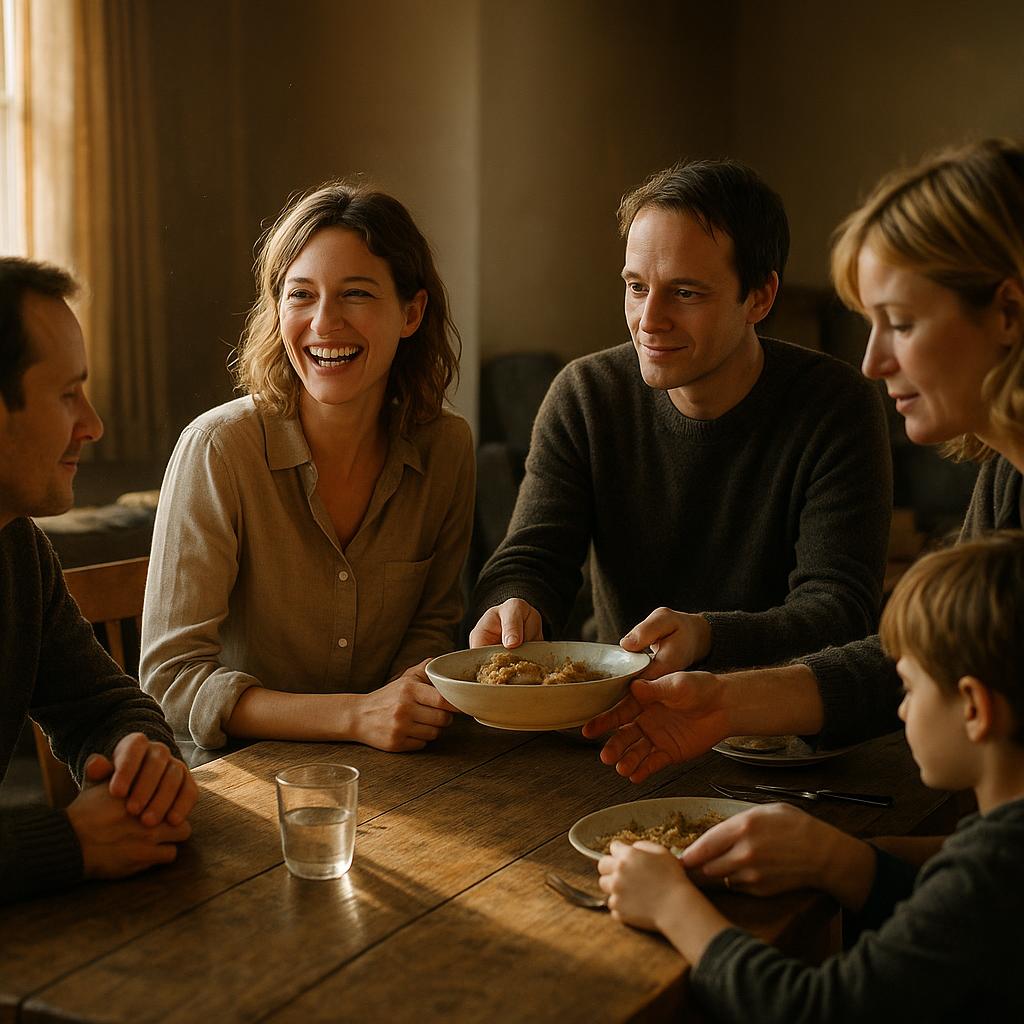 Image by RM AI
Image by RM AI
KEEP ON READING

The 10 Youngest Monarchs In History & The 10 Oldest
Age Is Just A Number. Imagine being crowned king or…
By Chase Wexler Mar 11, 2025
Written By The Victors: 20 Names History Books Tried To…
History’s Forgotten Figures. It is said that history is written…
By Farva Ivkovic Jun 23, 2025
Writing On The Wall: 20 Fascinating Hieroglyphics Throughout History
A Language Carved To Last. Hieroglyphics are unique, ancient writings.…
By Chase Wexler May 29, 2025
Women At War: 20 Fierce, Fearless, & Famous Female Fighters
How Many Of These Women Warriors Do You Know?. History…
By Emilie Richardson-Dupuis Aug 14, 2025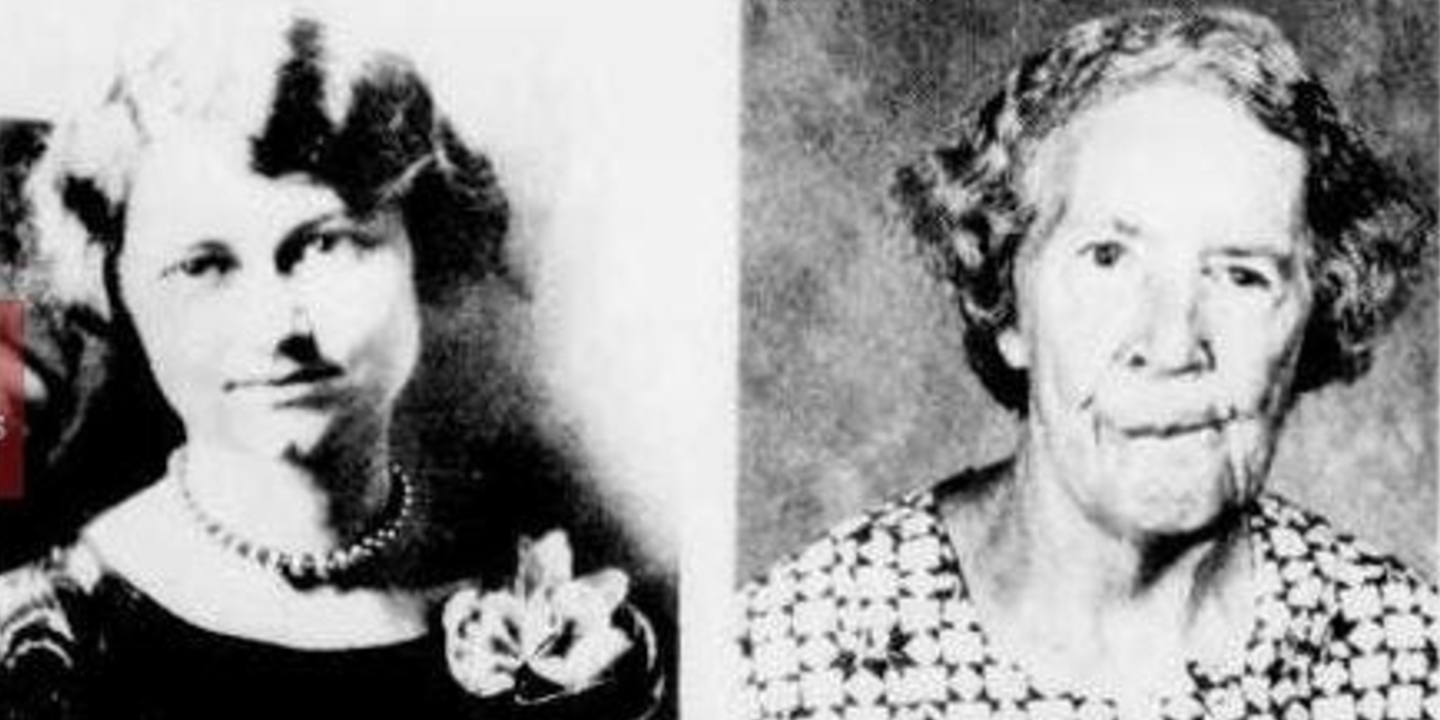
The Woman Without A Name
Mary Doefour was the woman without a name. In 1978,…
By Robbie Woods Dec 3, 2024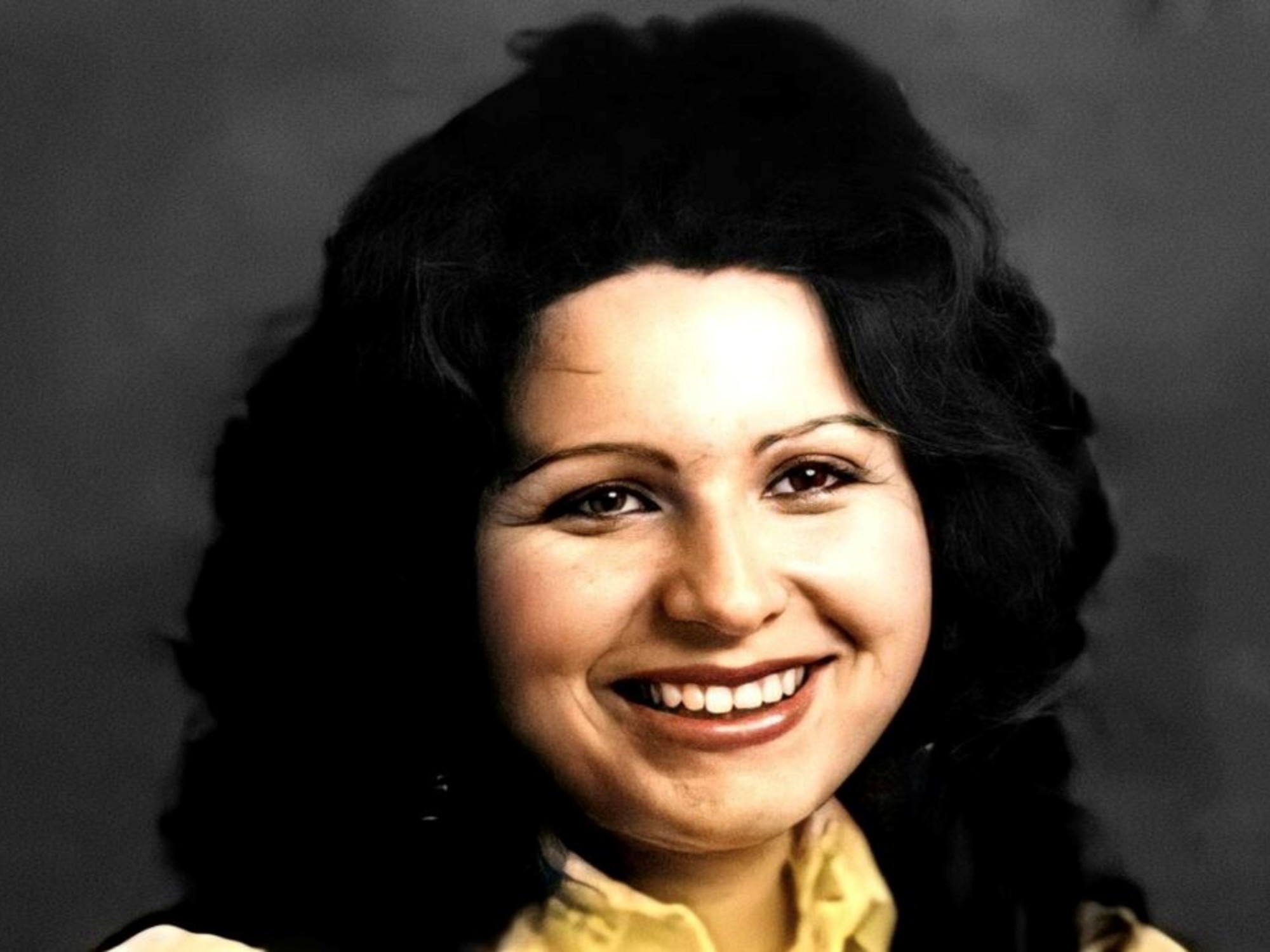
The Woman With Toxic Blood
One night in 1994, Gloria Ramirez reported to the ER.…
By Robbie Woods Jan 6, 2025
